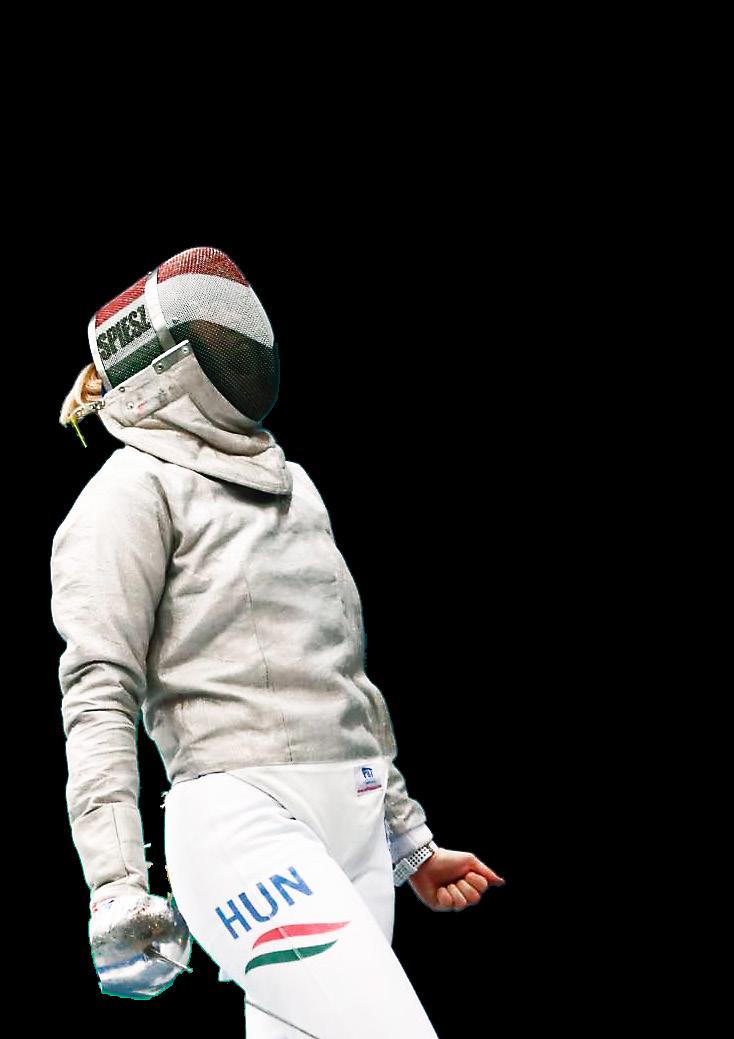
Issue Nᵒ. 3 / 2024April


Directory TouchéWorld Content Issue Nro. 3 / 2024 - April
Editorial
Greetings to all youth fencing enthusiasts!
Fencing World Championship
2023 Junior and Cadet
The future of world
Fencing arrive in Riyadh
Behind the mask
Anna Spiesz
Life trainers...
Élite Fencing Club
Behind the mask
Samuel Imrek
Regís Trois de Avila
A legend of world refereeing
Behind the mask
Kruz Schembri
Behind the mask
Mariavittoria Berretta
Behind the mask
Mattia Conticini
Behind the mask
Gabriela Hwang
Poor diet and its influence on sports performance
Behind the mask
Victoria Guerrero
Behind the mask
Lana Lee
The prosperous and cosmopolitan City of Riyadh
EDITOR JEFE: Calú Pargas JEFE DE PRENSA: Antonio Vásquez PERIODISTAS: María Leonor Colmenarez, Alberto
Diaz Peluso REDACCIÓN Y TRADUCCIÓN: María Trinidad Colmenares
CORRESPONSAL BRASIL: Lafaiete Papaiano
CORRESPONSAL EE.UU: Ana Graciela Ramos Otero MARKETING DIRECTOR: Claudia Romero MARKETING DIGITAL & RRSS:
Bianna Indelicato Pardo, Sebastián Pargas VENTAS Y SUSCRIPCIONES: Sami Doria Vertel DISEÑO GRAFICO: Andrés Felipe Castro
SALUD Y NUTRICIÓN: Lcda. Ivett Khawan DATOS E INVESTIGACIÓN: Pedro Godoy PRODUCCIÓN AUDIOVISUAL: Claudia Romero
WEBMASTER Y PROGRAMACIÓN: Hawrison Avendaño, David Mateo García Vallejo
05 06 30 32 10 26 16 36 22 41 38 20 14 24 34
TouchéWorld Magazine | YOUNG
Greetings to all youth fencing enthusiasts!
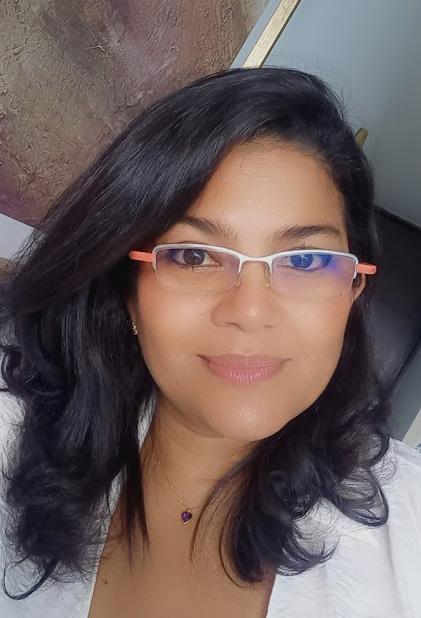
 Calú Pargas Gabaldón CEO & Fundadora Editorial Touché
Calú Pargas Gabaldón CEO & Fundadora Editorial Touché
It is our pleasure to present a new edition of TouchéWorld Magazine | YOUNG, where we explore the passion and excellence in Junior and Cadet fencing.
In this exciting issue, we dive into the world of youth fencing with exclusive interviews with world-class athletes. From their beginnings in the sport to their greatest aspirations, these conversations reveal the secrets behind the success of these young champions and inspire us all to achieve our goals with determination and dedication.
A special interview with referee Regis Trois de Avila, a prominent figure in the world of fencing. From his refereeing experience to his reflections on the current state of the sport, this interview offers a unique perspective from the heart of the action.
And, of course, we couldn’t forget the highlight event of the year: the 2024 Junior and Cadet World Championships in Riyadh, Saudi Arabia. With special coverage, we bring you a recap of last year’s event and a preview of this exciting tournament, where the world’s best young fencers gather to compete for glory and honor on the piste.
At TouchéWorld Magazine | YOUNG, we are committed to celebrating the talent, dedication and competitive spirit of young fencers around the world. This issue is a tribute to their hard work and determination, and we are excited to share their stories with our global community of fencing fans.
Get ready to dive into the exciting world of youth fencing and enjoy every page of this unique edition!
Fencing World Championship
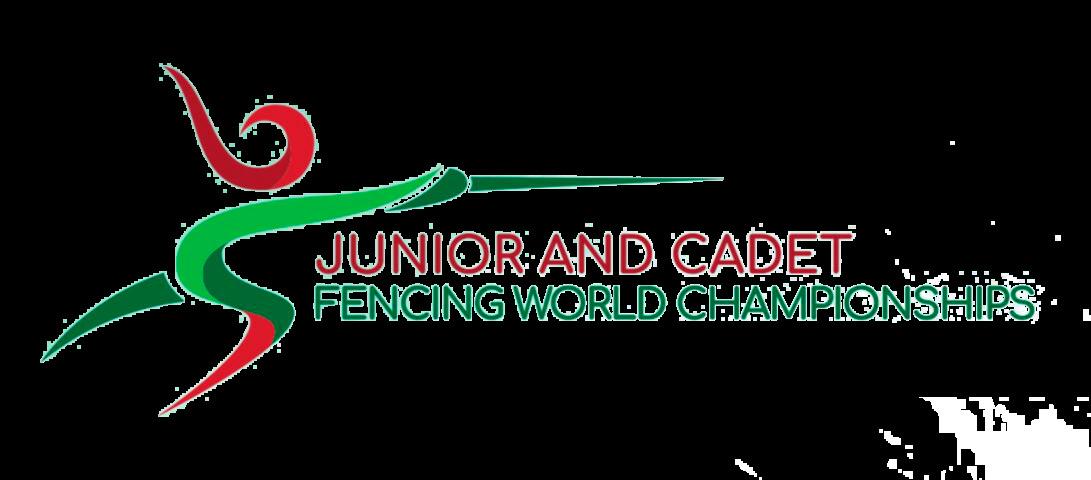
2023 Junior and Cadet
America’s outstanding performance in Plovdiv
American representation shone during the 2023 Junior and Cadet Fencing World Championship, leading the overall medal table of the competition with a total of 15 medals, including eight gold, two silver and five bronze.
The United States showed its dominance in the junior and team events in the city of Plovdiv, Bulgaria, where the competition was held, winning seven world titles, four of them individual and three by team, while in the cadet category events, they added one gold medal.
Hadley Husisian (épée), Zander Rhodes (foil), Magda Skarbonkiewicz (sabre), and Colin Heathcock (sabre) added a gold medal in junior, while sabreist William Morril climbed to the top of the podium in cadet.
The Americans completed their successful participation during the Team events, by winning three gold medals courtesy of the men’s saber team and the two foil teams.
Hungary stands out
Hungarian fencing had an outstanding participation in Plovdiv,
after placing second in the overall medal table, adding nine podiums, including four gold and five bronze medals.
Hungary’s outstanding performance focused on the cadet category, in which they ended up winning three gold medals, courtesy of the épéeists Blanka Nagy and Domonkos Pelle, while Emese Domonkos won the title in the women’s saber.
Hungary’s fourth gold at the World Championships came through the women’s saber team.
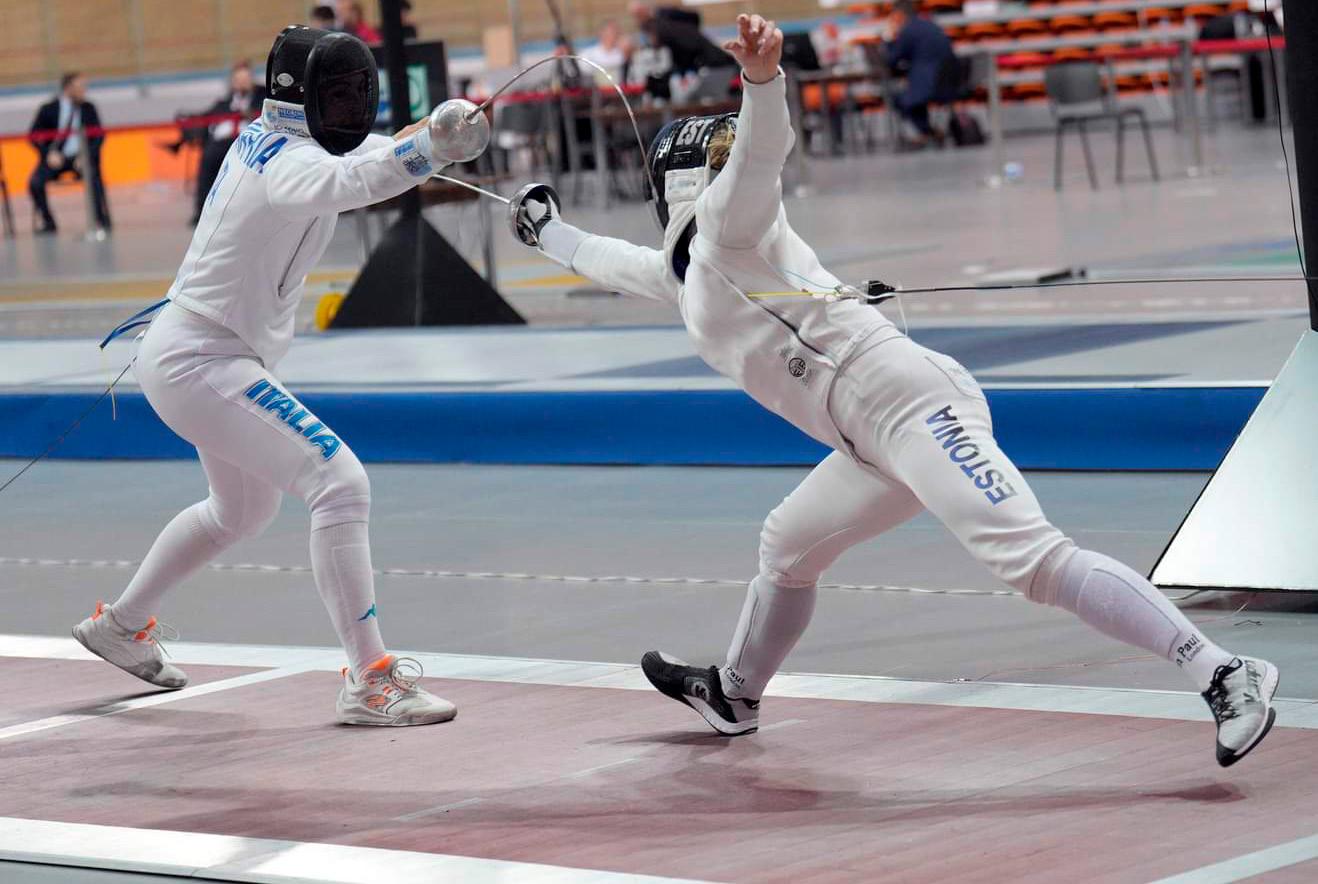
World Championship 2023 Junior and Cadet 6
Egypt, Italy and China in the Top 5
After the performance of their fencers, the delegations from Egypt, Italy and China managed to integrate the Top 5 of the World Championship, by achieving the presence of fencing from Africa, Europe and Asia in the first places in the medal table.
Egypt praised the representation of the African continent, by winning six medals, including two titles, through the men’s épée, after Mohamed Yassen won the championship in the Junior individual event, which they revalidated in the team event.
Italy won seven medals in the competition, distributed in one gold, four silver and two bronze. The Italian title was brought by the young Damiano Di Veroli, who became champion in the Junior individual foil.
China stood out on the Asian continent, after adding four medals, including one gold, one silver and two bronze. China’s gold came through Yifan Guo, who won the title in the cadet individual foil.
Poland and Great Britain with gold
Poland and Great Britain’s representatives were bathed in gold during the contest, after winning a gold medal each.
The Polish fencing title came courtesy of the women’s épée team, while the British gold came through Amelie Tsang, who became champion in the cadet individual foil.
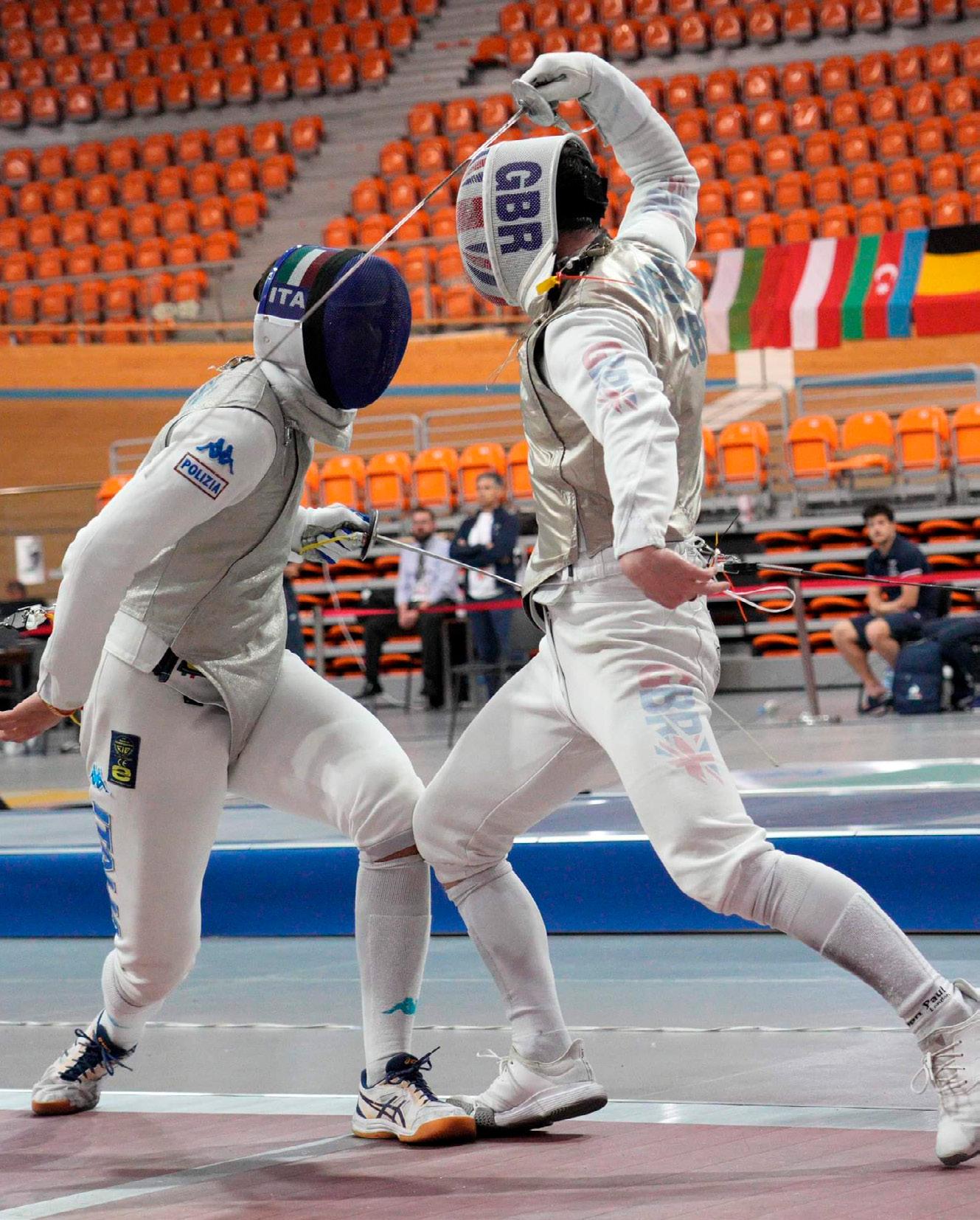
Medalists
2023 Junior and Cadet
Inidividual Results
Cadet Category
Women’s Épée

Blanka Nagy

Mizuki Homma

Li-Hsiang Hung

Nicole Xuan
Men’s Foil

Yifan Guo

Hyeakjun Choi

Mattia Rubin

Abdelrahman Tolba
Men’s Épée

Domonkas Pelle

Kruz Schembri
Noam Duchene
Rayan Rami Rozpide
Women’s Sabre

Emese Domonkos

Zarifa Huseynova
Jenna Shoman

Nargiza Jaksbaeva
Women’s Foil

Amelie Tsang
Greta Collini
Emily Jing

Shun Yat Wong
Men’s Sabre
William Morril
Benedykt Denkiewicz
Taylor Chon

Ahmed Hesham
7 TouchéWorld Magazine YOUNG
Inidividual Results
Junior Category
Women’s Épée


Men’s Épée


Women’s Foil

Men’s Foil


Anna Maksymenko Yunjia Zhang Soma Somody
Women’s Sabre



Men’s Sabre



Gergo Szemes Anna Spiesz Shido Tsumori
Women’s Épée
Men’s Épée
Women’s Foil
Men’s Foil
Women’s Sabre
Men’s Sabre

Junior
8
World Championship 2023
and Cadet
Country País Gold Gold Silver Silver Bronze Bronze United States of America 8 2 5 Azerbaijan Hungary 4 0 5 Virgin Islands Egypt 2 1 2 0 0 1 Italy 1 4 2 0 0 0 0 2 1 Canada China Japan Spain 1 0 1 3 2 2 0 0 0 0 0 0 0 0 1 1 1 1 Hong Kong Poland Switzerland Uzbekistan Ukraine Bulgaria 1 0 0 2 2 1 0 0 0 0 0 0 0 0 0 0 0 1 1 1 1 Taipei Great Britain France Korea Israel Tukey Rumania 1 0 0 0 1 1 0 0 0
Medal table
Husisian Poland Zander Rhodes United States of America Mohamed Yassen Egypt
Di Veroli United States of America Magda Skarbonkiewicz Hungary Colin Heathcock United States of America Alicja Klasik United States of America Lauren Scruggs Italy Theo Brochard Switzerland Zhaoron Zeng Italy Yuina Kaneko Italy Mao Kokubo Egypt Nicole Feygin China Aurora Grandis China Samuel
Hungary
Kumbla Japan Nisanur Erbil Bulgaria Enmanuele
Rumania
Teams Hadley
Damiano
Imrek
Samarth
Nardella

The future of world
fencing arrive in Riyadh
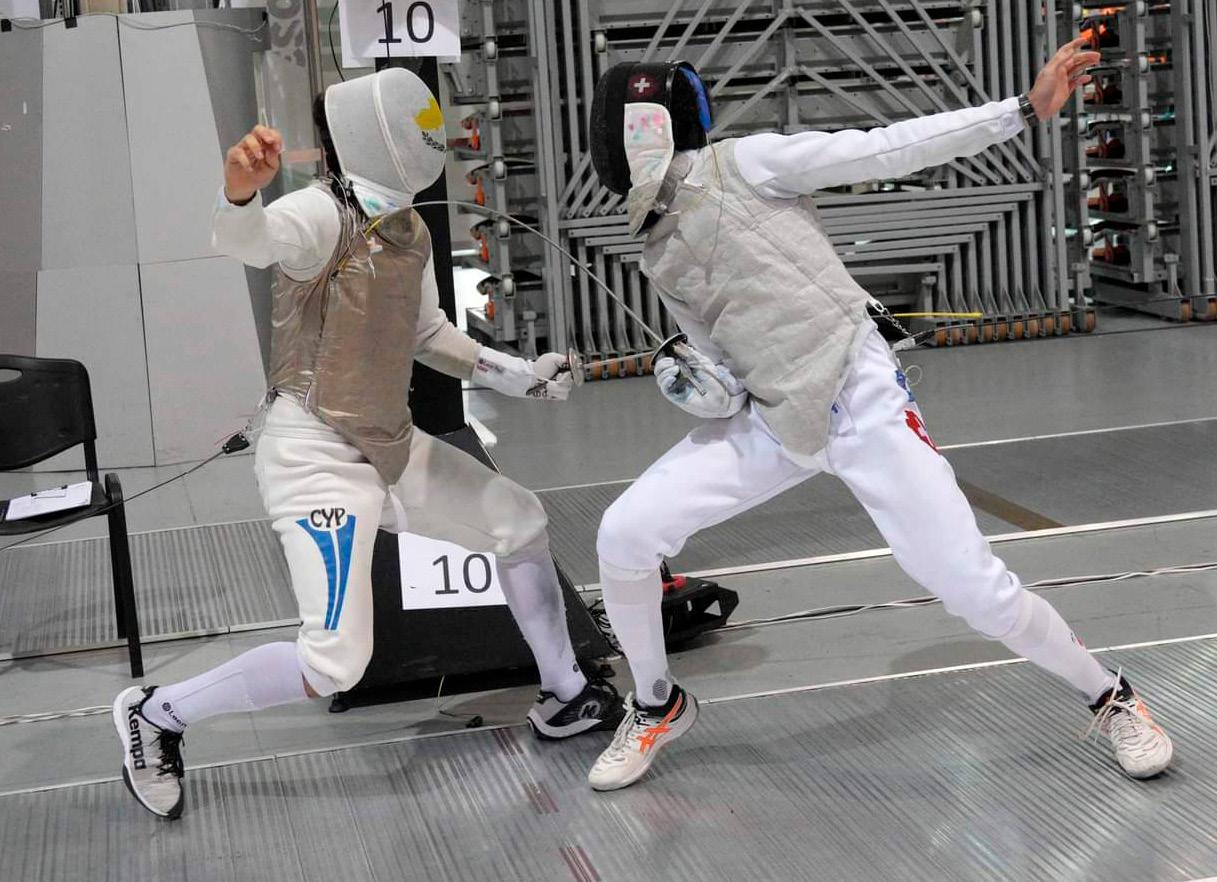
The future of the piste arrives to the prosperous city of Riyadh, in Saudi Arabia, to participate in the 2024 edition of the World Cadet and Junior Fencing Championships, to be held from April 12th to 20th.
The skills of the young fencers will be exhibited during nine days of competition in the Middle East, where participants will seek to establish themselves as world champions of the discipline.
More than a hundred fencers, including cadets and junior, are expected to attend the King Saud University Sports Stadium, in the
capital of Saudi Arabia, with the conviction of exalting their respective countries.
The event, which is being held for the first time in the Saudi country, will feature 18 exciting events, both individually and in teams, in all three weapons and both genders.
In addition to the competition, athletes and coaches will participate in a training camp, as well as in extrasports activities in which they will have the opportunity to learn about anti-doping, Safe Sport and Fair Play.
A great place, for a great event
The 2024 edition of the World Cadet and Junior Fencing Championships will take place in the spectacular facilities of the King Saud University Sports Stadium, an architectural beauty that combines state-of-theart modern design with functional elegance, ideal for holding a major event like the fencing world championship.
Located in the heart of Riyadh and with capacity for 10,000 spectators, the arena has been designed to
The future of world fencing
give attendees a great experience, offering clear views from all angles with high-tech lighting and sound systems that create an immersive experience for everyone.
United States and Hungary favorites
After the latest results in the event and the current events of its new fencers in the different competitions, the representatives of the United States and Hungary are among the main candidates to lead the overall medal table of the contest.
Among those enrolled for the American delegation, the presence of the medalists in the last edition of the competition stands out, such as Emily Jing, Samuel Imrek, Samarth Kumbla, and Daniel Zhang.
Within the Hungarian fencing delegation, repeat medalists Blanka Nagy and Soma Somody, who arrive in Riyadh with great expectations.
During the last 2023 edition of the Cadet and Junior World Championships, the United States team dominated the competition by adding 15 medals, including eight gold, while Hungary was second in the medal table, with five gold medals.
World ranking leaders will be present
In addition to the attendance of the medalists from the last edition, within the group of those registered to participate in Riyadh, there are the current leaders of the world ranking, according to the International Fencing Federation (FIE), such as Radu Nitu (ROM), Anna Maksymenko (UKR), Mohmoud Yassen (EGP), and Anna Spiesz (HUN), who are strong candidates to fight for the 2024 world title in their respective weapons.
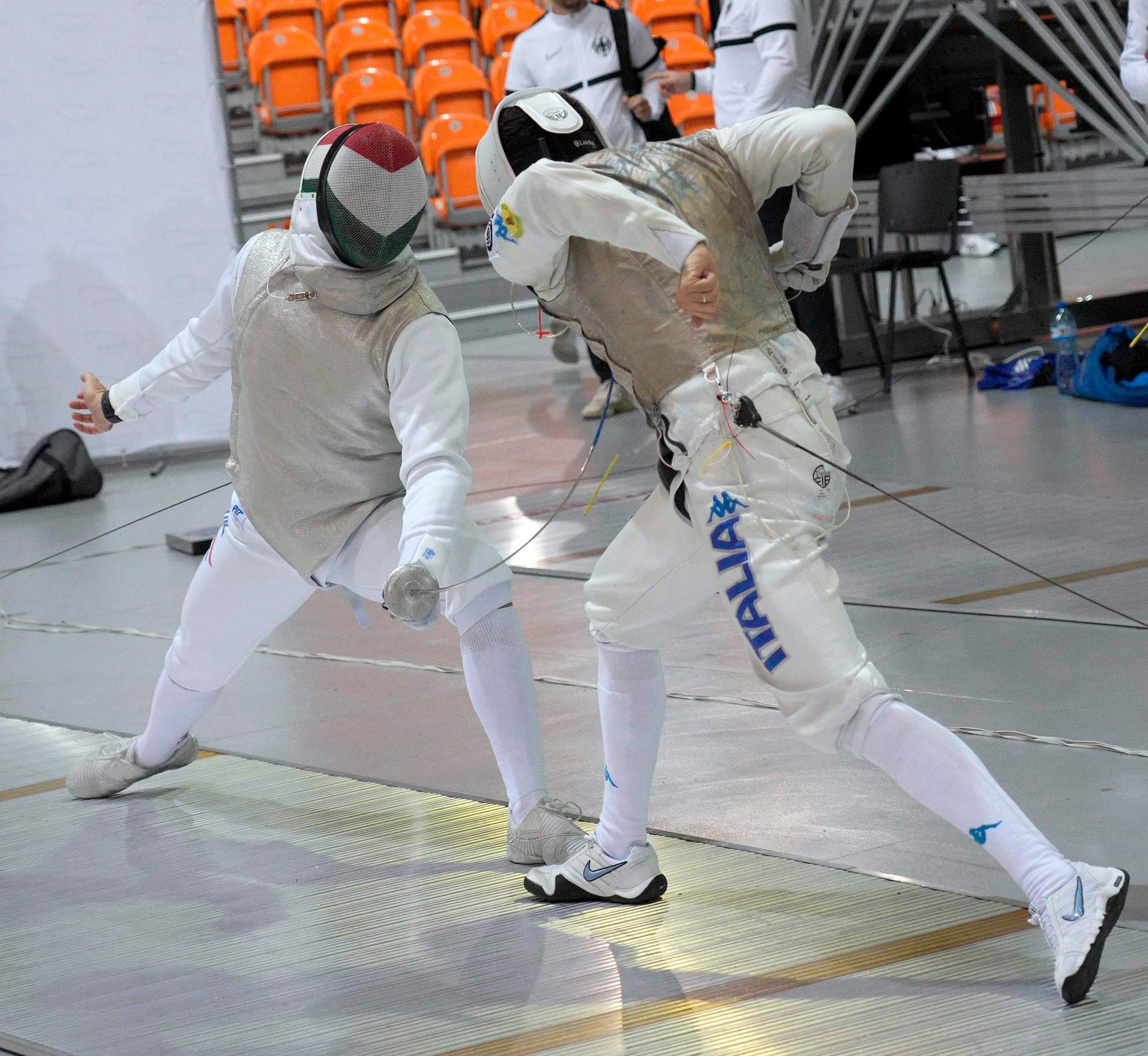
TouchéWorld Magazine YOUNG
2024 Junior & Cadet Fencing World Championships Schedule
Friday, April 12
Opening Ceremony
Junior Men’s Individual Foil
Junior Women’s Individual Foil
Monday, April 15
Junior Men’s Individual Épée
Junior Women’s Individual Épée
Thursday, April 1
Junior Men’s Individual Sabre
Junior Women’s Individual Sabre
Saturday, April 13
Cadet Men’s Individual Foil
Cadet Women’s Individual Foil
Tuesday, April 16
Cadet Men’s Individual Épée
Cadet Women’s Individual Épée
Friday, April 19
Cadet Men’s Individual Sabre
Cadet Women’s Individual Sabre
Sunday, April 14
Junior Men’s Team Foil
Junior Women’s Team Foil
Wednesday, April 17
Junior Men’s Team Épée
Junior Women’s Team Épée
Saturday, April 20
Junior Men’s Team Sabre
Junior Women’s Team Sabre Closing Ceremony
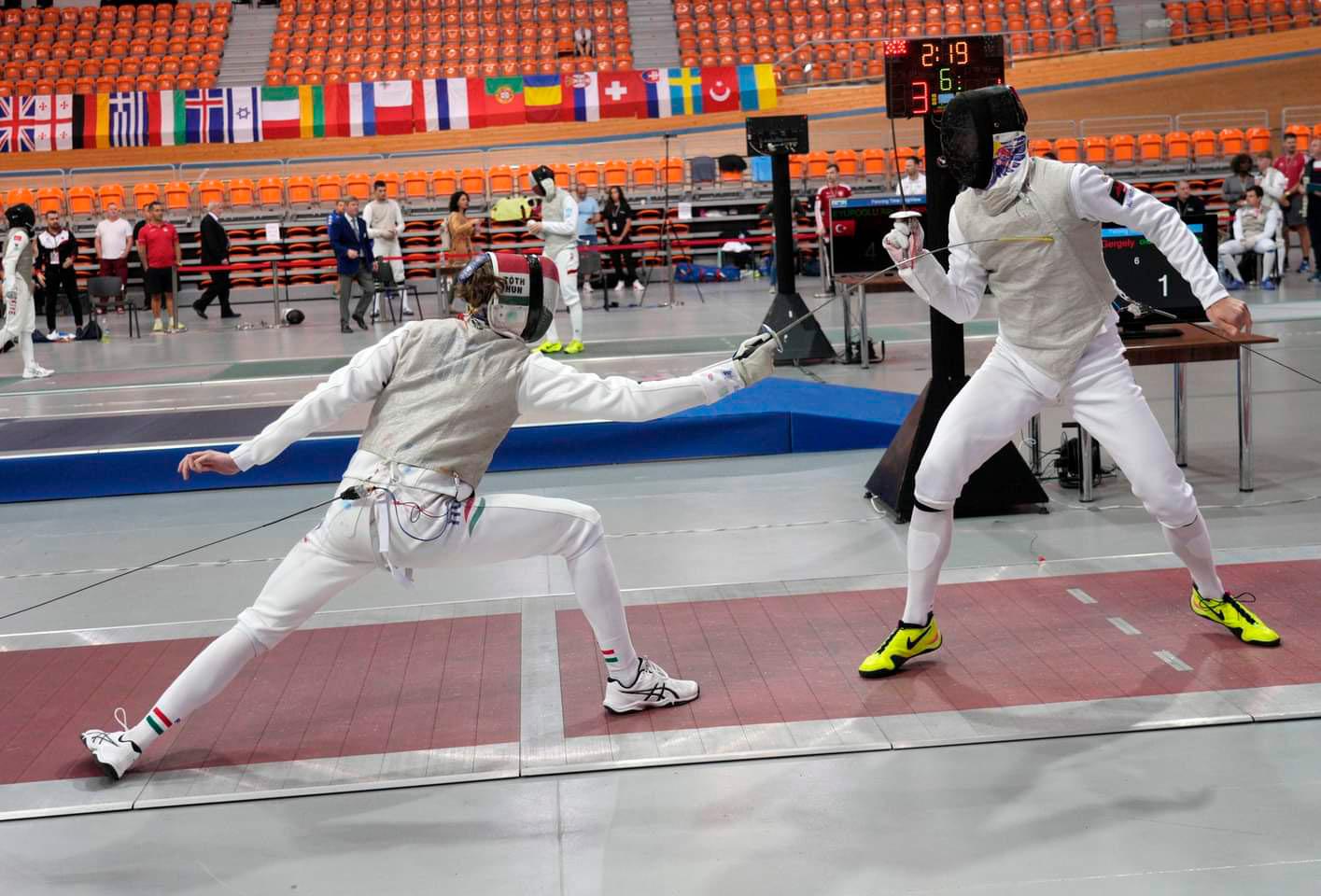
The future of world fencing 12

ANNASpiesz
TW: How did you get into the world of fencing and at what age? Who inspired or motivated you to start this sport?
AS: I was 7 years old when I started fencing at my school. First we started learning the basics, then we started using sabers too. My Mother told me about fencing, and I thought why not. It was my best decision ever.
TW: What other sport catches your attention?
AS: I swam for 6 years, but I didn’t like it that that much. For a year I did both, but after swimming I chose fencing.
TW: Who are those who have supported you the most in your career as a fencer?
AS: My family, especially my Mother. They are always by my side. They supported me throughtout my fencing career.
TW: What has motivated you to remain a fencer?
AS: Firstly the fencing community. Secondly the milestones that I achived.
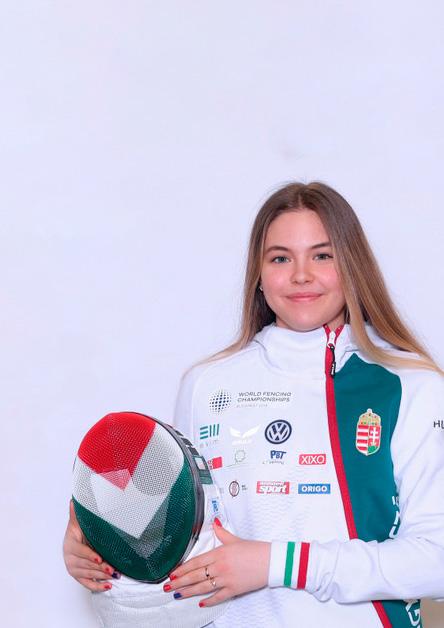
Name: Anna Spiesz
Nickname: Anna
Place and date of birth: 2005.07.30
Club: Vasas SC
Weapon: Sabre
Handedness: Right

Behind the mask / Anna Spiesz (HUN)
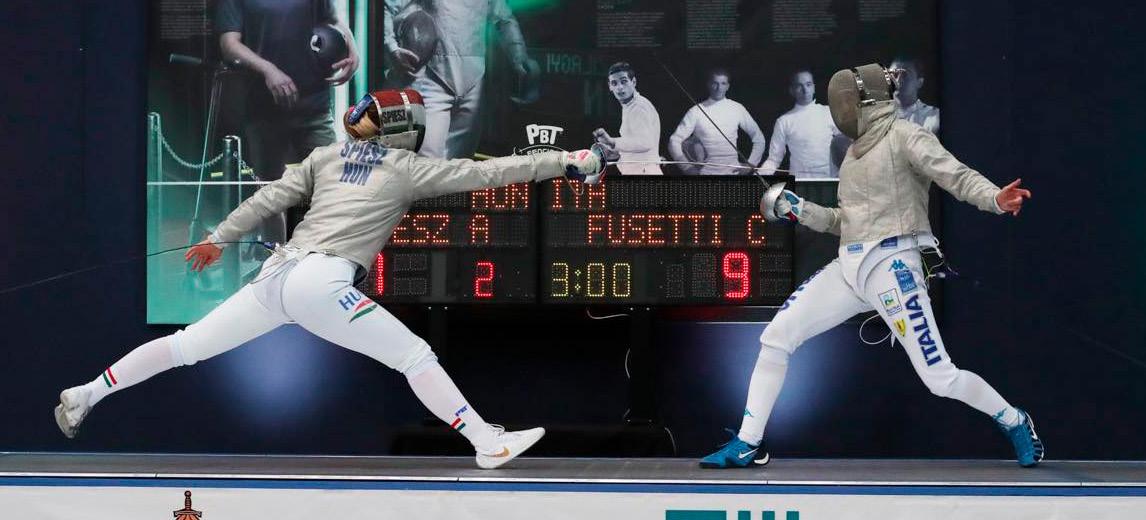
TW: What do you consider to be your strength as a fencer?
AS:That I always know what I want to do on the piste, and I can dominate physically.
TW: So far, what has been your greatest achievement in fencing?
AS: I am really proud of my third place at the 2023 Fencing World Championships, Plovdiv.
TW: Which fencing figure do you admire the most?
AS: My new idol is Sara Balzer. Last senior world cup we fenced and it was really motivating.
TW: What do you think has been the key to getting to where you are now?
AS: Humble work, and a good support system.
TW: What do you consider to be the most difficult thing about being a fencer?
AS: That is not just about the strenght, the mental things are more important. So you always need to be focused and concentrated
TW: How many hours do you train every day?
AS: I train about 2-3 hours/day, plus competitoins at weekends.
TW: Do you have any special diet? Is there any food that you avoid eating?
AS: I follow a basic personal diet and i try to eat generally healthy.
TW: Do you listen to music to train or compete?
AS: Yes, I always listen to music. I have a specific playlist for competitions.
TW: What are your hobbies?
AS: I don’t really have any freetime, but if I have I love to read thrillers and spend time with my loved ones.
TW: What dream do you have as an athlete and on a personal level?
AS: My dream is to be at the 2028 Olympics and to have a succesful personal career and have a loving family by my side.
TW: How do you combine your life as an athlete with your personal life?
AS: Sometimes it’s really hard as I’m still in high school, but I have really supportive teachers and friends so that helps a lot.
TW: We would like you to tell us an anecdote that you remember for a special reason.
AS: You can take out as much as you put in the hat.
TW: Could you share with us a difficult moment in your life?
AS: Didn’t really have any major difficulties during my career.
TW: What has been the happiest moment in your life?
AS: The happiest day in my life was when I placed third at last year’s World Championship. It was my first individual medal from the Worlds.
TW: How do you recover after a defeat?
AS: After a defeat I’m obviously really sad, but I always try to be positive. I think about it as an opportunity to learn from my mistakes.
TW: Who is the coach that has had the most impact on you in your career?
AS: I only had 1 coach in my entire career as a fencer. His name is Miklós Kósa. He was by my side since I started fencing. He is almost like a father figure to me. I really enjoy working with him.
TW: What has been your greatest achievement on the piste?
AS: I am really proud of my third place in 2023 Fencing World Championships, Plovdiv.
TW: What do you think about when you fight?
AS: I try to only focus on my fencing, my technic and my tactics. I always think about the next touch that I want to do.
TW: Who is the opponent that has made it difficult for you in your years of competition?
AS: I would rather not mention any fencer, because every competition is different.
TW: What advice would you give to new fencers?
AS: To always be diligent, because hard work pays off.
15
Life trainers...Élite Fencing Club
Under the philosophy that with effort and perseverance anything can be achieved, at Elite Fencing Club they have dedicated themselves to promoting fencing at both a competitive and recreational level, giving space to all those interested in practicing the art of this discipline. Located in the city of Los Angeles, United States, Elite Fencing Club provides high quality training and world-class fencing level to all its members, regardless of their ability and level of physical condition.
“At the same time, we commit to fostering a respectful and supportive environment, always conveying to our athletes that with hard work anything is possible,” highlights Elite Fencing Club, an organization founded by two-time Olympian Tarek Ayad, who opened the doors of the club, with the intention of following his passion for the piste and sharing his knowledge and experience to children, young people and adults.

Education and motivation
Through the years, the club has shown its commitment to discipline and teaching in an attractive way, motivating to value the participation of children, young people and adults, who express interest in this sport.
4943 Mcconnell Avenue Suite N
Horarios de entrenamiento:
Monday, Wednesday, Friday 5:00 p.m. to 8:20 p.m.
Tuesday, Thursday 5:00 p.m. to 8:20 p.m.
Saturday 9:00 a.m. to 12:00 p.m.
www.elitefencingclub.com/about elitefencingclubhr@gmail.com
“The Elite Fencing Club coaches always seek to promote values such as respect, camaraderie and commitment to their training,” highlights the group of coaches that make up the club.
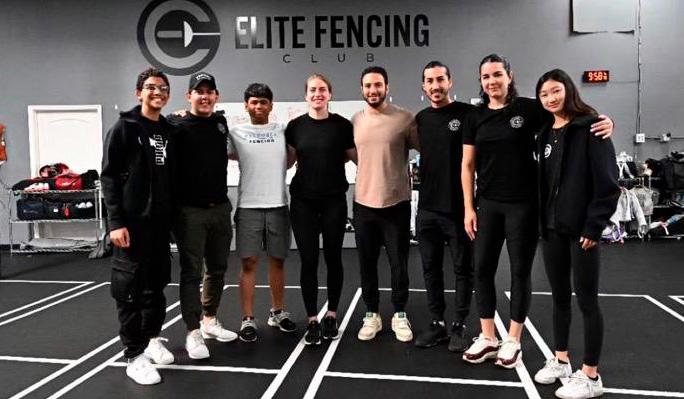
16 Life Trainers
Los Angeles United States of America
Multicultural fencing
Elite Fencing Club is known for opening its doors to all fencing practitioners, regardless of their countries of origin, becoming a multicultural club, teaching classes to athletes from different continents.
“We do not have an exact number of athletes in the club because there are many international athletes who also come seasonally to prepare for international competitions, and they choose our club to train,” they said from the club specialized in foil and épée.
Getting the most out of the fencer
For Elite Fencing Club, the vision focuses on providing world-class
training in order to bring out the highest level of the athlete, regardless of the person intention to become an Olympic fencer, attending an elite university or simply being strong and happy.
“As a club we are satisfied to see the good performance of our athletes and the progress in each competition, as well as being able to help them both in sports and in their personal development.”
Fencing: a source of empowerment
For Elite Fencing Club, the practice of fencing transcends beyond sports, since it influences as a source of empowerment, which they consider key to personal growth and self-
esteem, also providing concentration and self-control of impulsiveness.
“In our club we teach fencing as a process to train technical, tactical, and physical ability, therefore, it is a fantastic sport not only for physical fitness, but also to stimulate the mind, strengthen the spirit and discipline, and always encourage socialization with teammates and coaches.”
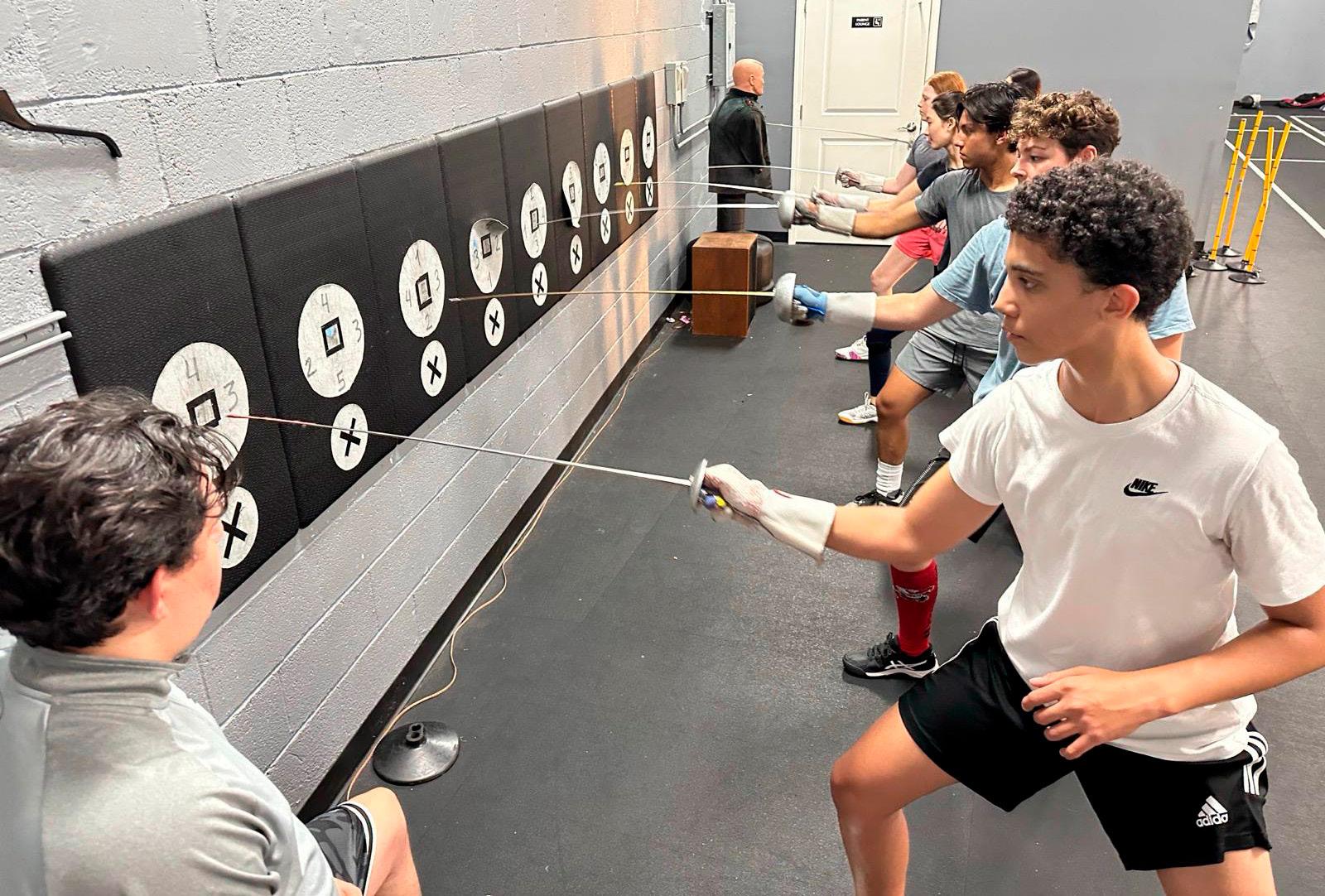
17 TouchéWorld Magazine YOUNG


SAMUELImrek
Name: Samuel Imrek
Place and date of bir th: 08/17/2005.
Missouri city Texas
Club: Alliance Fencing Academy
Weight: 145 lbs
Height: 5’8
Weapon: Épée
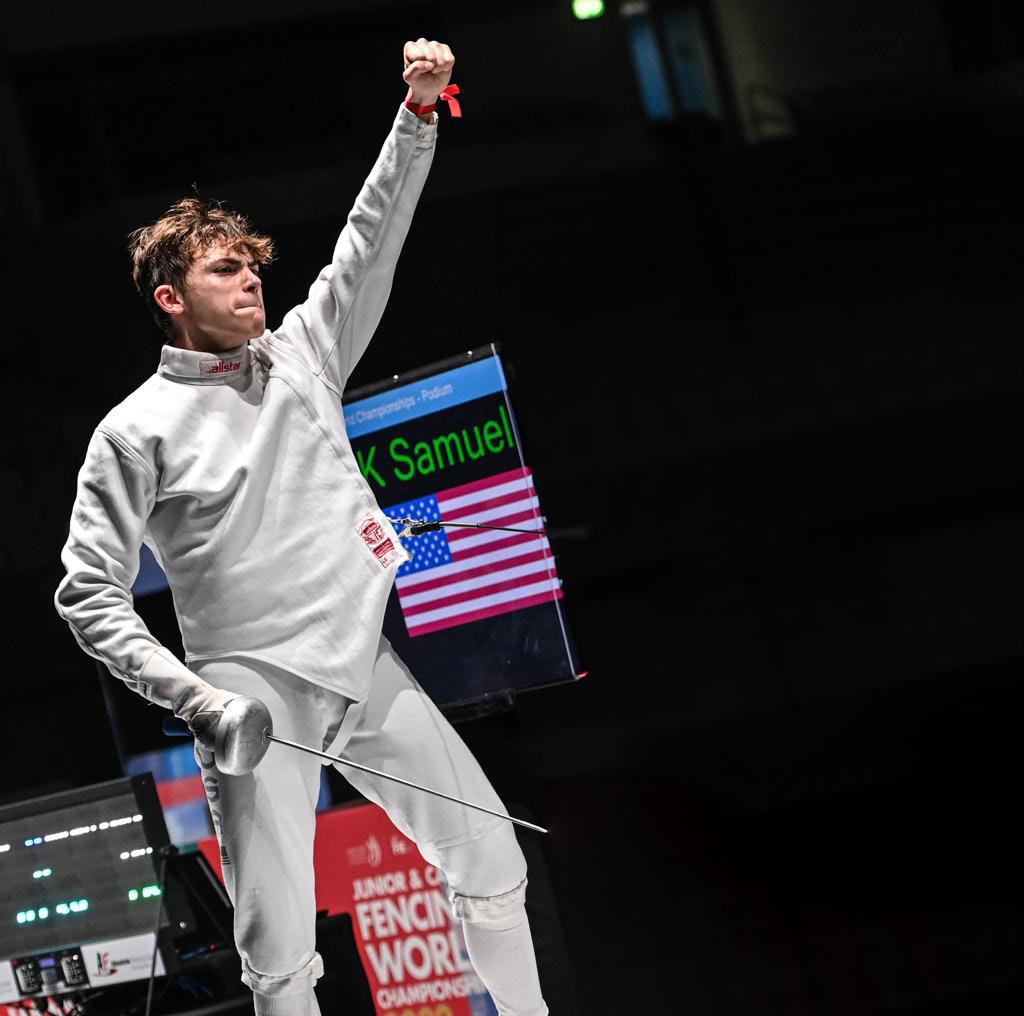
TW: How did you get into the world of fencing and at what age? Who inspired or motivated you to start this sport?
I started fencing at age 5 I was into Star Wars and lightsabers, so my dad had the idea of putting me into fencing
TW: How many hours do you train every day?
2-4
TW: How many hours do you rest?
Whenever I am not excersizing
TW: Do you follow any special diet?
I do not have a special diet Generally speaking, I try to eat mainly healthy foods such as Meat, Rice, eggs, fruits, etc But it is not rare for me to eat junk food or sweets I do not do anything special for preparation other than trying to get into the right mentality
Behind the mask / Samu Imprek (USA) 20
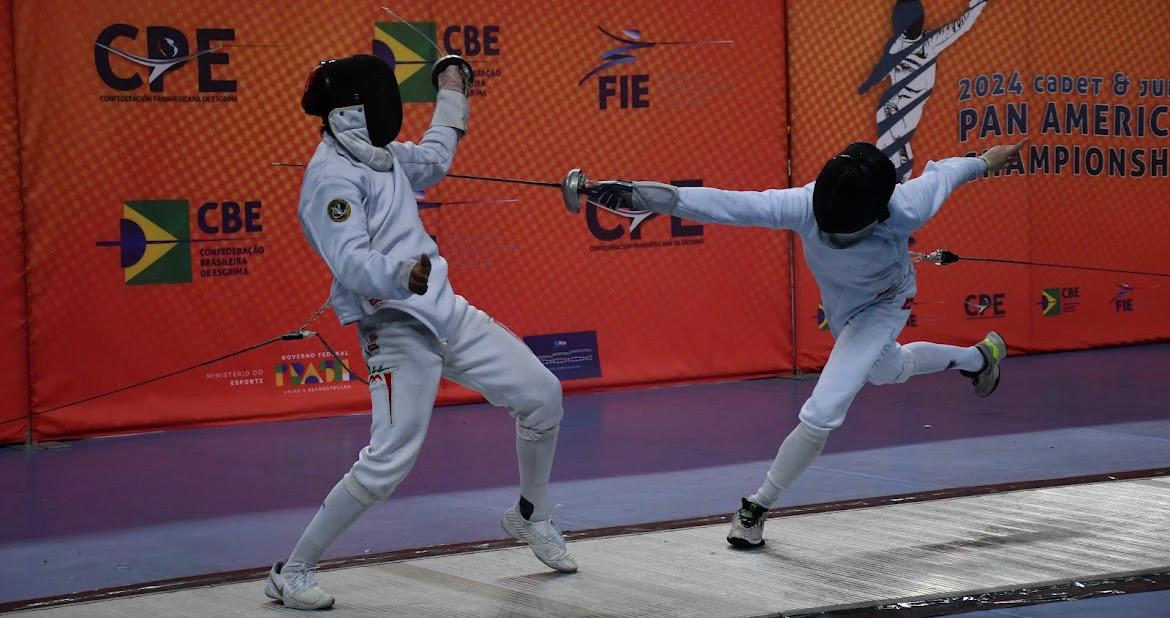
TW: Who is the opponent that has made it difficult for you in your years of competition?
The hardest opponent I had to face so far is Frederico Vismara. I lost to him in the Semi Finals of a senior grand prix earlier this year. He has a lot of talent and skill, but I will be ready next time.
TW: Do you listen to music to train?
Yes
TW: What hobbies do you have apart from fencing?
Reading and watching YouTube.
TW: What dream do you have?
To shape the world as we know it into a better place. As far as Fencing goes, I would love to one day earn an Olympic gold.
TW: We would like you to tell us an anecdote that you remember for a special reason?
One memory is of Cadet World Championships in 2022 during the semi-final. I was down 12-6,
which usually means that the bout is already lost. But that time I was able to steadily come back and took the win at 15-14.
TW: Could you share with us a difficult moment in your life?
Possibly in the year 2021 when I was about to quit the sport due to lack of success. Shortly after I started finally making results, which caused me to keep going and led me to where I am today.
TW: What has been the happiest moment in your life?
Winning the Cadet World Championships in April 2022. That was my first major accomplishment internationally, and it was a huge reward for all my hard work.
TW: How do you recover from defeat?
It is hard to lose. But I try my best to get in the right mindset and move forward, as well as learn from my mistakes.
TW: What phrase or philosophy of life do you identify with?
“We are the Gods of the atoms that make up ourselves, but we are the atoms of the Gods that make up the Universe”—Manly P Hall. Basically, there are a lot things that we can control, but there are also a lot of things that we cannot. We need to have the wisdom to discern which is which.
TW: Who is the coach that has had the most impact on you in your career?
Andre Geva and Natalie Dosert are my two main coaches. They coach me on the strip and are responsible for much of my success
TW: What do you think about when you are in combat?
I think about what the opponent is doing and how to counteract it. I am thinking of what to do when the opponent adjusts as well
TW: What advice would you give to new fencers?
Do everything. Train hard, sleep well, study bouts, and most importantly, don’t let a few bad tournaments ruin your mentality.
TouchéWorld Magazine YOUNG
Regís Trois de Avila A legend of world refereeing
His experience defines the calm personality and fair character that he has imparted on the piste for more than two decades as an International Referee, and that he shares today as a facilitator in the professionalization courses of the International Fencing Federation (FIE).
On this occasion Touché World Magazine spoke with the well-known Brazilian Master and Referee, Regís Trois de Avila, who, although he recognizes that the process was not
easy, defines his career delivering justice in the piste as “victorious.”
Influenced by a family legacy, Trois began fencing, a sport in which he remained an athlete for 20 years, until he saw refereeing as a springboard to discover the best of fencing in the world.
“I didn’t always have the idea of being a referee. At first, refereeing gave me the opportunity to watch the most modern of world fencing, but later,
I liked the mission of becoming a referee,” recalls the man born in Porto Alegre, Brazil.
Specialized in all three weapons, Regis began his development in 1987 during the Junior World Championship in São Paulo, when he took the FIE exam, however, his official career as an International Referee began in 1998, when he participated in La Chaux- des-Fonds, Switzerland – Senior.
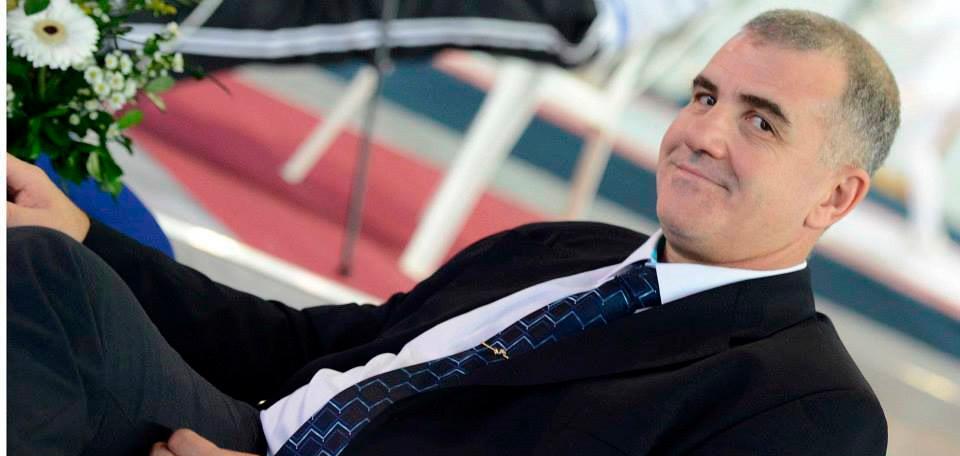
TW: What was the process like to become a professional referee?
RTA: It was very calm. At first I didn’t think I was going to continue refereeing, however as time went by I became an FIE referee.
1987 – FIE Category “B” International Referee (3 weapons) 1999 – International Referee Category “A” FIE Épée 2011 – IWAS referee 3 weapons
TW: How do you define your career as a referee?
RTA: Victorious, I had the opportunity to referee 5 Olympic Games. 13 Gold medal decisions have passed through my hands.
TW: What is the most difficult or complex thing about arbitration?
RTA: Like any athlete, a good referee prepares mentally and studies the theory of the rules so as not to have doubts when deciding a hit.
I believe that a referee has to master three situations when facing two competing fencers. Know, Feel and Apply.
TW: What excites you most about your duties as a referee?
RTA: The possibility of being part of a show, where no one can remember your name. In a perfect combat, you never remember the referee. When you
22 The referee / Regís Trois de Avila
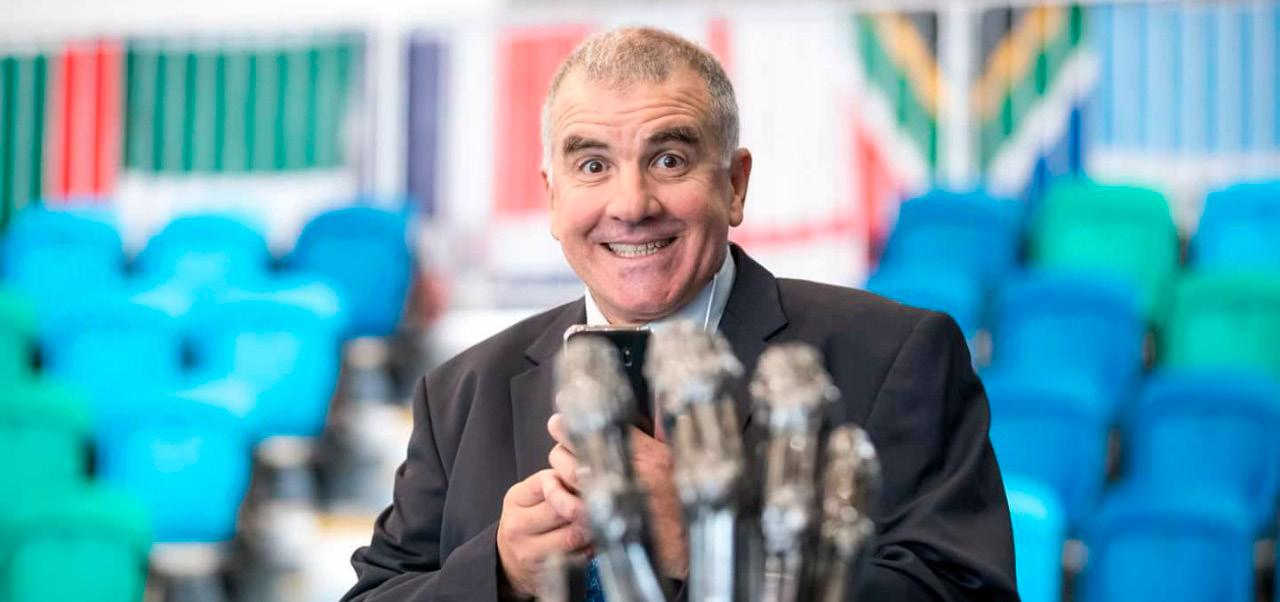
remember a referee, usually, there was something you didn’t like.
TW: What is the relationship between a referee and the athletes like?
RTA: It is a chess game where the referee is the one who has to dominate (most of the time). To a referee, athletes and coaches are just acquaintances, not friends.
TW: How important is referee training?
RTA: It is the most important part for you to be a good referee. It is not possible for athletes to prepare, for coaches to sweat, for parents to deliver and pick up, participate, and a referee is not prepared. It is unfair that a referee does not prepare and train.
TW: What has been the happiest or most satisfying moment during your role as a referee?
RTA: My first call in 2000, for the Olympic Games in Sydney, Australia. I did not expect that. When they told me that my participation was confirmed, I was beyond happy.
TW: What has been the most difficult or uncomfortable moment during your role as a referee?
RTA: When I was not invited to referee the Tokyo 2021 Olympic Games. I thought it would be my last Olympic participation, where I was closing my career in the FIE.
TW: Any anecdotes that you remember during your role as a referee?
RTA: I have 2 moments. First. I always liked being happy and making jokes with children. Whenever I have a group of little ones working on an event, I treat them as “my work team.” At my first World Cup, I went to the bathroom just
when they called me to referee. In no time all the little ones “from my work team” were running after me, trying to find me. Luckily, I arrived on time. The second was during the World Championship in Nimes, France in 2001, when I refereed the match between Estonia and Hungary. When the problem of spending the match time is passed, without looking for hits, the FIE immediately creates the Rule of Passivity. It is possible to watch this historical moment on the Internet. The title is “The Match That Changed Fencing Forever [Epee]”
TW: What is your biggest dream as a referee?
RTA: Finish my career among friends who remember my time on the piste in a fair, honest, competent and happy way.
Continue reviewing my experiences for the younger ones, training more referees.
Palmarès
2011 Best referee in the world in épée by the FIE – Dead Sea/Jordan
2013 Second best referee in the world in épée by the FIE
2013 FIE Épée Elite Group (only the 5 best in the world by weapon)
2014 Best Épée Referee in the World for the second time
2015 Second Best Épée Referee in the World by the FIE
2016 Third Best Referee in the World in Épée by the FIE
23
KRUZSchembri
Name: Kruz Schembri
Place of birth: Coral Springs FLORIDA
Date of birth: October 25, 2006
Club: Masters Fencing Club and Tampa Fencing Academy
Weight: 155 lbs
Height: 6’2
Weapon: Épée & Foil
Handedness: Right
Country: Virgin Islands

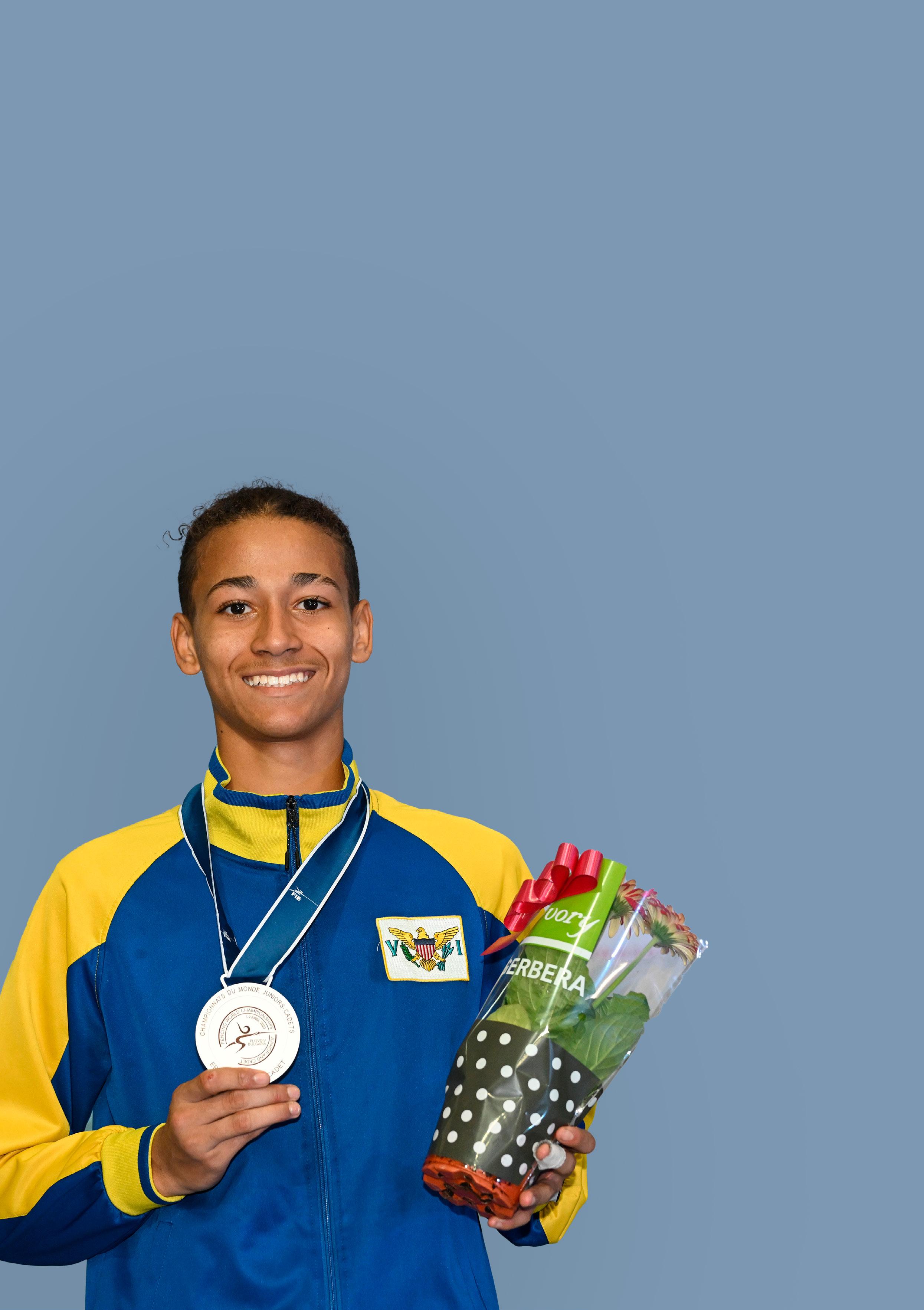
TW: How did you get into the world of fencing and at what age? Who inspired or motivated you to start this sport?
KS: At 9 years old, I loved playing chess, but spending all day at competitions wasn’t quite fulfilling my need for physical activity. So, my mom discovered fencing, often called “physical chess,” which offered the perfect blend of strategy and athleticism.
TW:How many hours do you train every day?
KS: I train 3 hours a day from Monday to Saturday and run 30-45 miles (48-72 kilometers) per week for endurance.
TW: How many hours do you take for resting?
KS: I typically reserve Sundays for relaxation and quality time with my family. It’s a chance for me to recharge mentally and emotionally, getting ready to tackle another intense week of training ahead.
TW:Do you have any special diet?
KS: I don’t follow a strict diet plan, but I make an effort to eat healthily and avoid excessive junk food.
Behind the mask / Kruz Schembri (USA)
TW: Who is the opponent that has made it difficult for you in your years of competition?
KS: I believe that every opponent presents a challenge because each person has their own unique style that you must uncover. However, I find some of the toughest opponents to be my own teammates because they are familiar with both my weaknesses and strengths.
TW:Do you listen to music to train or compete?
KS: I sometimes listen to music when I train but when I do it’s usually rap music.
TW: What hobbies do you have besides fencing?
KS: Some hobbies I have besides fencing is running, tennis, and reading
TW: What dream do you have as an athlete and on a personal level?
KS: I want to qualify for Olympic Games and win a gold medal.
TW:Could you share with us a difficult moment in your life?
KS: Obtaining quality training in fencing is a challenge for me as my
local area in Florida isn’t renowned for top-tier fencing. Thus, I must travel elsewhere to access high-level training opportunities.
TW: What has been the happiest moment in your life?
KS: My happiest moment was getting 2nd in Cadet Men’s Épée and 6th place in Cadet Men’s Foil at the 2023 Cadet World Championships in Plovdiv, Bulgaria.
TW: How do you recover after a defeat?
KS: I usually take some time to analyze what went wrong, learn from my mistakes, and identify areas for improvement. Then, I focus on regaining my confidence and motivation, reminding myself of my goals and why I love fencing. Finally, I channel any frustration or disappointment into renewed energy and commitment to perform better in the future.
TW: What phrase or philosophy of life do you identify with?
KS: Develop a passion for learning. If you do, you will never cease to grow.
Enjoying the process of learning in fencing means approaching each training session with curiosity and openness. By embracing new techniques and feedback, you can celebrate progress and find fulfillment in every step of improvement.
TW: Who is the coach that has had the most impact on you in your career?
KS: My coaches, Rafael Suarez and Enrique Claro, have been incredible mentors both on and off the fencing strip. Their unwavering support and encouragement have played a pivotal role in my growth and development as a fencer.
TW: What advice would you give to new fencers?
KS: Embrace the Learning Process: Understand that fencing is a journey, and improvement takes time. Be patient with yourself as you learn new techniques and strategies. Have Fun: Remember to enjoy the sport! Fencing is not only physically demanding but also incredibly rewarding and exciting. Celebrate your successes, and don’t forget to have fun along the way.
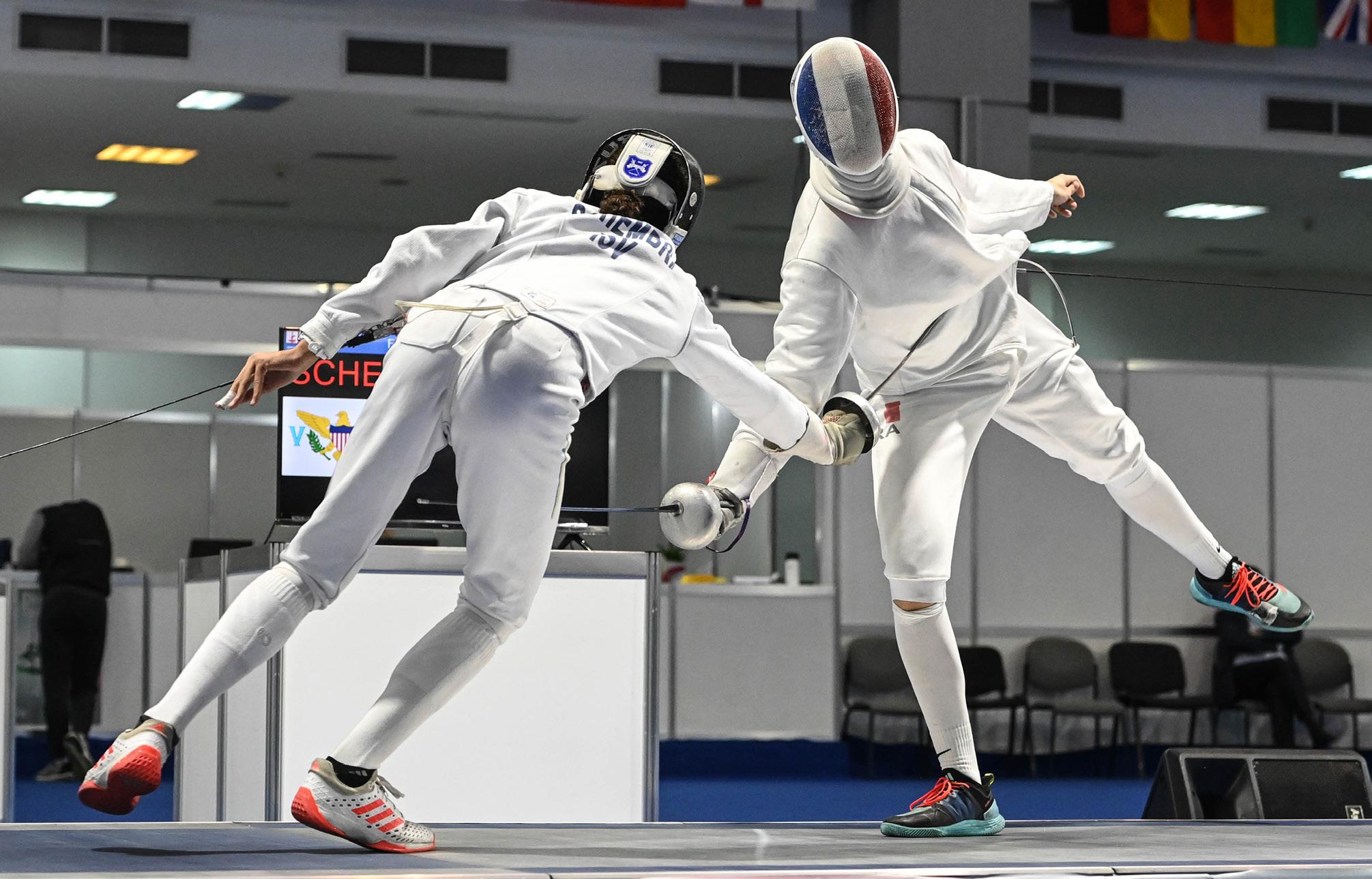
25 TouchéWorld Magazine YOUNG
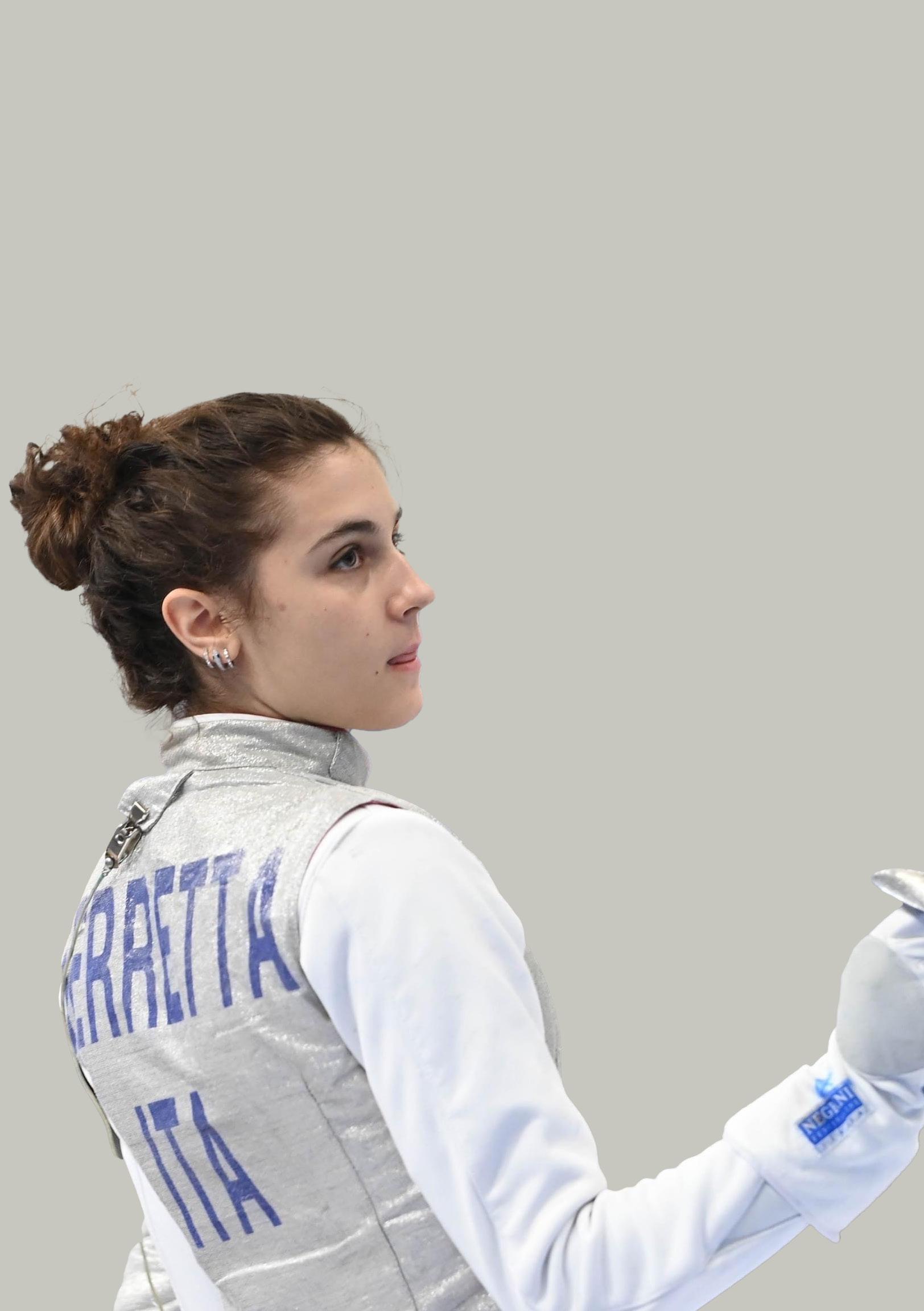
MARIAVITTORIABerretta
Name: Mariavittoria Elvira Berretta
Nickname: Vitto
Place of birth: Catania
Date of birth: 7/03/2007
Club: Frascati Scherma (RM)
Weight: 56Kg.
Height: 1,72cm
Weapon: Foil
Handedness: Right

TW: How did you get into the world of fencing and at what age? Who inspired or motivated you to start this sport?
ME: My first sport was swimming but I quickly moved on to modern dance. The dance room was one floor above the fencing gym and I was very attracted to this sport which I was able to spy on from a distance for two years. Only at the age of nine did I convince my mother and, having pulled down the mask, I immediately felt at ease. The first race came after two months and from that moment on I never stopped. I don’t think I was inspired by... I just felt a strong attraction and great curiosity.
TW: What other sport catches your attention?
ME: In the summer I happen to practice other sports such as surfing or tennis for the pleasure of experimenting with new disciplines but not with the same enthusiasm with which I approach fencing.
TW: Who are those who have supported you the most in your career as a fencer?
ME: I wouldn’t have gotten this far without the practical support of my family, of my mother in particular who supported my choice to train in Frascati and for this reason she had to move away from home, from dad and from my brothers.
Behind the mask / Mariavittoria Elvira (ITA)
In my career as a fencer, the most complete support is certainly that of my Coach Fabio Galli with whom for several years now I have shared afternoons of training, technical growth but above all personal and moral growth. I gradually built a relationship of great complicity with him, he learned to understand the nuances of my character, he manages to bring out the best in me and tame moments of rebellion. He is an expert coach who always knows how to find the right balance, a wise and altruistic man, in him I appreciate that paternal manner that is at times sweet and rigorous.
TW: What do you consider to be your strength as a fencer?
ME: My strength as a fencer is perhaps my tenacity, my willpower, the desire to win.
TW: So far, what has been your greatest achievement in fencing?
ME: Fencing has given me many beautiful moments and also many results. If I had to choose the best now, I would say silver at the Cadet European Championships.
TW: Which fencing figure do you admire the most?
ME: I address my admiration to those like me who trained with limited means and a great desire to grow. One among all is Daniele Garozzo.
Dani trained in a small space used as a gym and after the lesson with his teacher he shot with a dummy. There are many common elements with him, both Sicilian, I also started in a small gym without platforms and with few members, today we are both trained by the same Fencing Coach.
TW: What do you think has been the key to getting to where you are now?
ME: The key to getting this far is probably the passion for this sport, many sacrifices and renunciations, hard work in the gym and the understanding with the Fencing Coach.
TW: What do you consider to be the most difficult thing about being a fencer?
ME: Learn to manage fear.
TW: How many hours do you train every day?
ME: I train on average four hours a day including athletic preparation.
TW: Do you have any special diet? Is there any food that you avoid eating?
ME: Yes, I follow a diet aimed at physical activity which I practice and I certainly limit sugars and fats to a minimum, it is not a rigid diet but certainly an attentive one.
TW: Do you listen to music to train or compete?
ME: Listening to music helps me during the warm-up before a race and during breaks. The sports halls are always very noisy and preparing with music gives me the right energy and keeps me focused.
TW: What are your hobbies?
ME: During the fencing season I have to dedicate my free time to studying so I just watch films and I like to crochet or knit. In the summer, however, surfing and SUP are my hobbies.
TW: What dream do you have as an athlete and what dream do you have on a personal level?
ME: My dream as an athlete remains a secret because I am very superstitious, on a personal level always “to have the freedom to choose”.
TW: How do you combine your life as an athlete with your personal life?
ME: My life as an athlete and my personal life in my case are not two separate things but combine naturally. My friends are in the gym, my affections as well.
TW: We would like you to tell us an anecdote that you remember for a special reason.
Here ‘s an anecdote.
I arrived in Frascati at the age of 13 and the first important victory with my new fencing coach was the National Title
“Gran Premio Giovanissimi”. That day I discovered that that was “the only title Fabio Galli was missing”, a victory with an athlete at the GPG.
TW: Could you share with us a difficult moment in your life?
ME: The most difficult moment? Definitely Salsomaggiore, First National Cadet Trial.
In the final an injury forced me to withdraw.
The following days forced to rest were really hard to overcome. The pain, the fear and the desire to get back on the piste as soon as possible. Experience surpassed.
TW: What has been the happiest moment in your life?
ME: The happiest moment was when I arrived at Frascati Fencing at 13 years old. It was all beautiful!
TW: How do you recover after a defeat?
ME: With a victory.
TW: Who is the coach that has had the most impact on you in your career?
ME: From that point of view, I was very lucky. I had two fencing coaches, one foreign and one Italian, very different from each other and with diametrically opposite methods. The hardest work certainly fell to Fabio Galli, my current coach.. He had to deal with my resistance towards his less induced and freer way of conceiving fencing. He was strict and firm when needed and sweet when I needed it and little by little this balance led us to achieve full trust and perfect understanding.
TW: What advice would you give to new fencers?
ME: As a former athlete, my grandfather always told me “As long as you have fun, this is your sport”. I advise new fencers to approach fencing as a game and have a lot of fun. I’ll admit it’s not easy.
27 TouchéWorld Magazine YOUNG
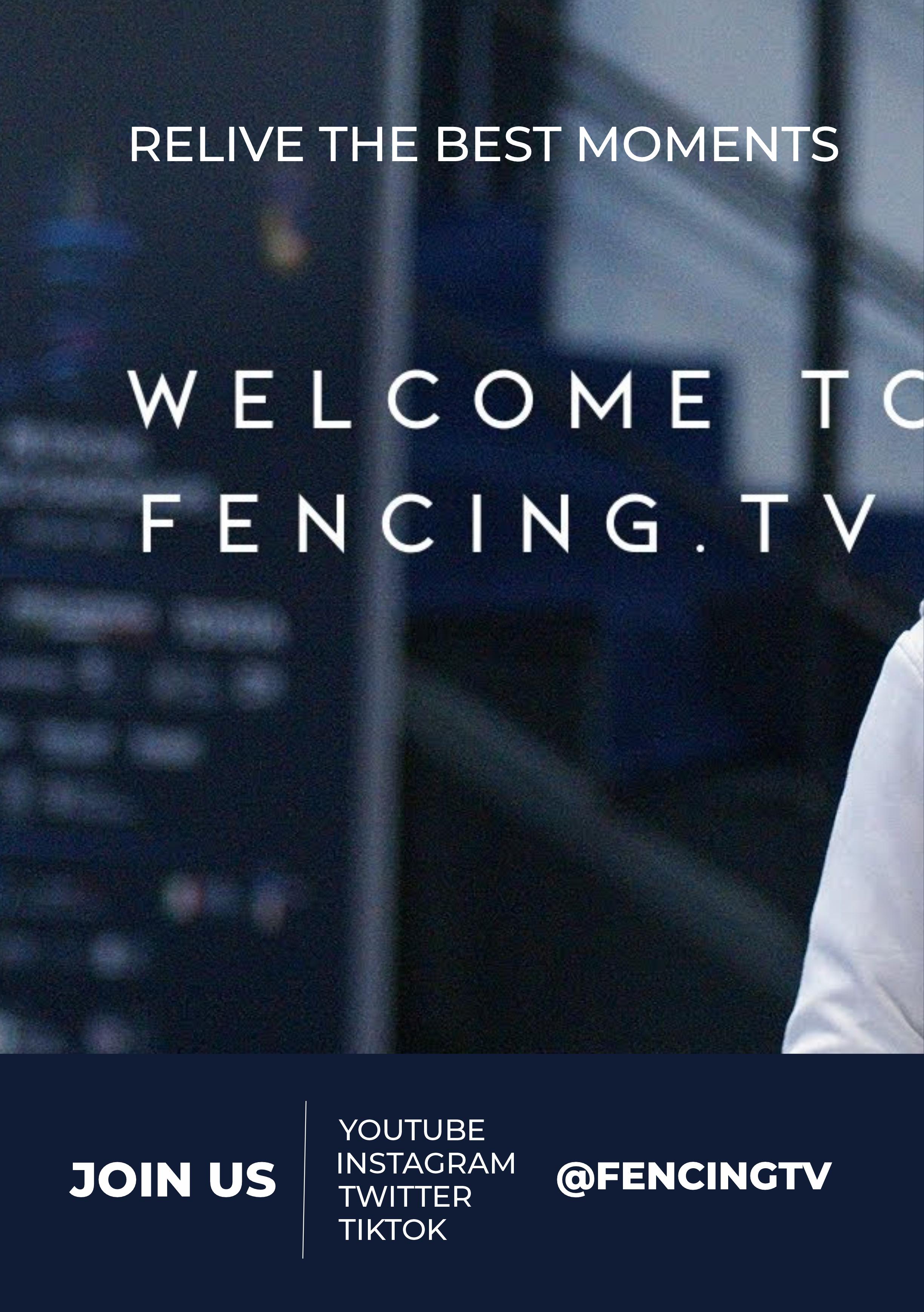
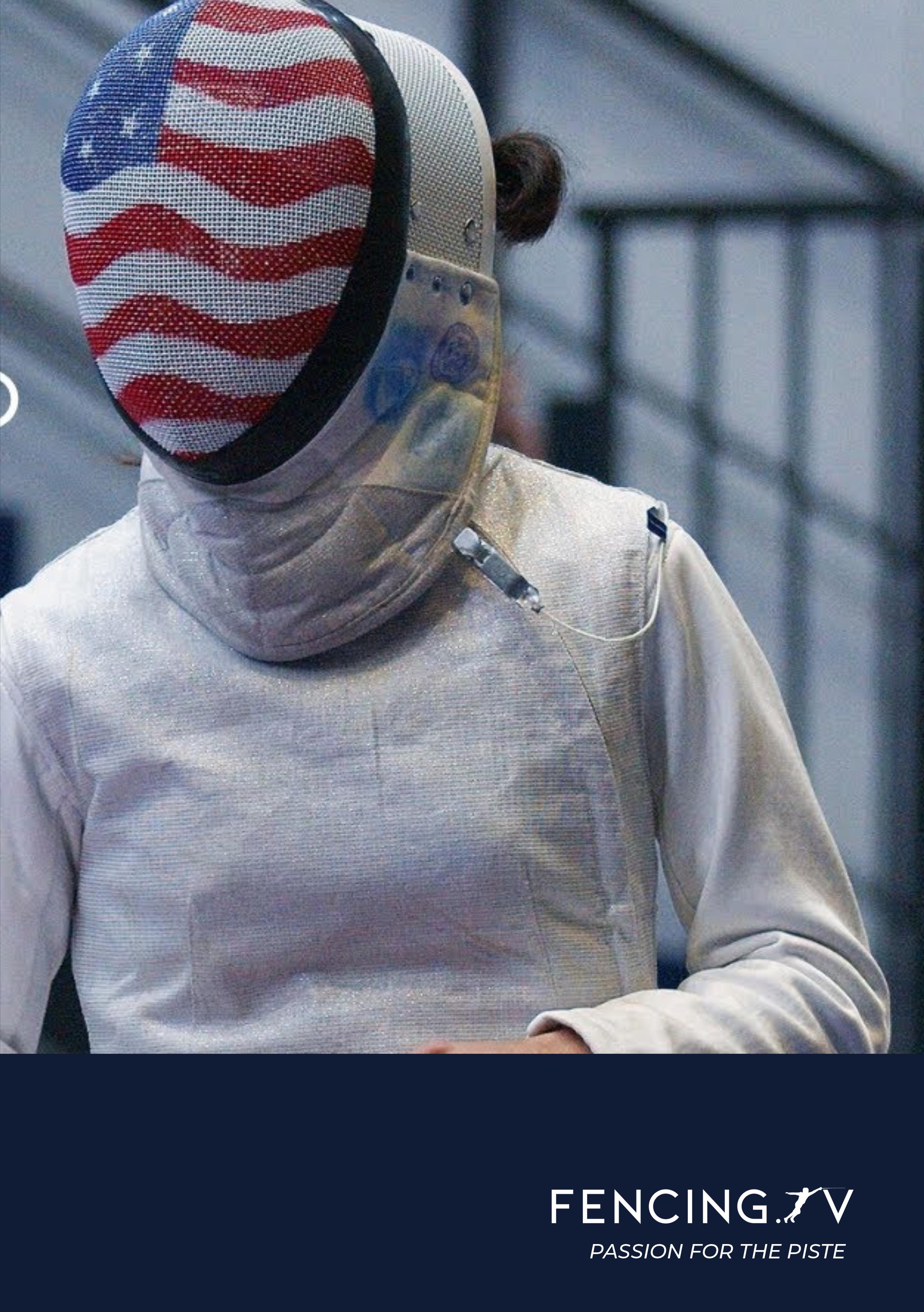
MATTIAConticini
Name: Mattia Conticini
Nickname: Matti
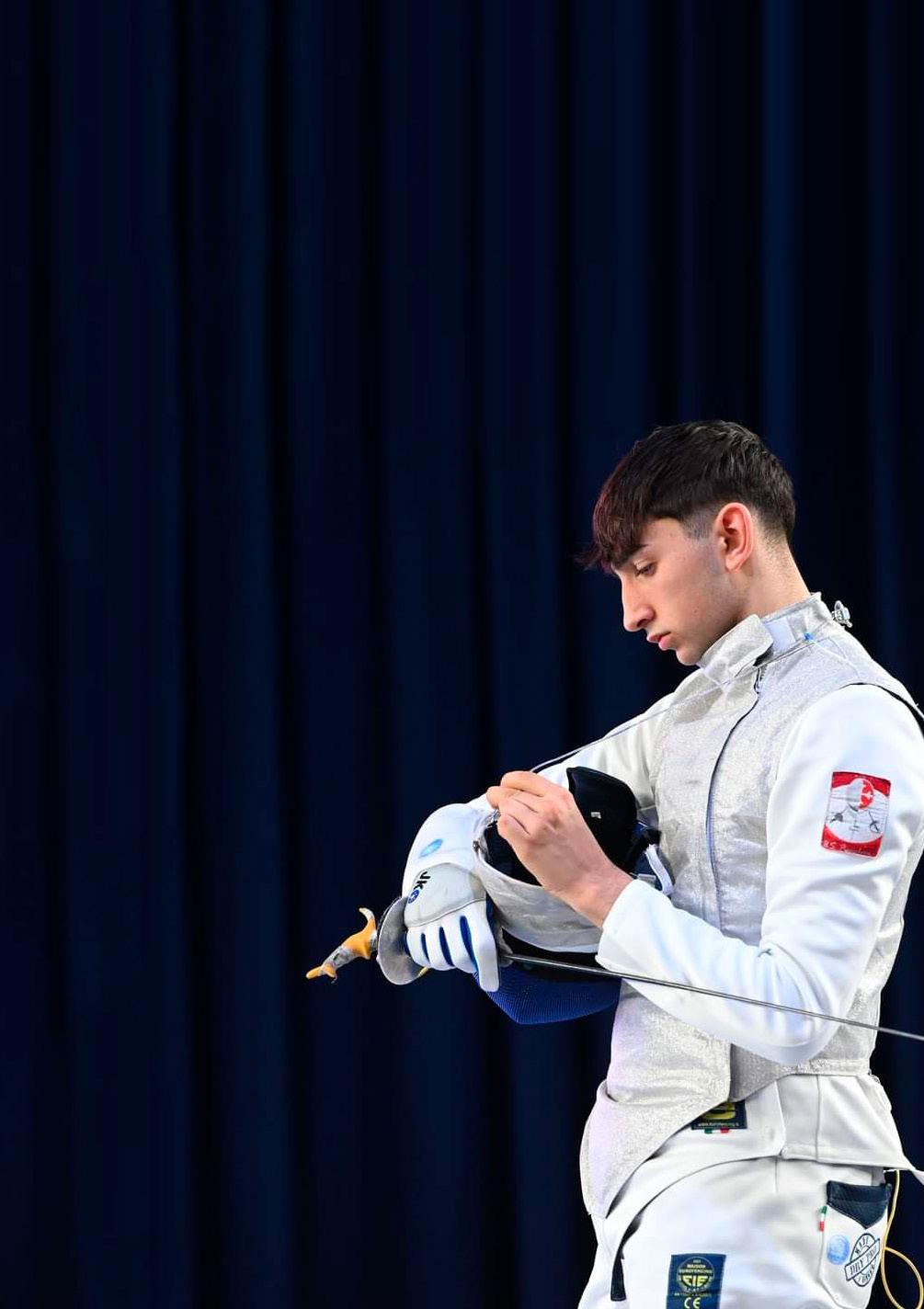
TW: How did you get into the world of fencing and at what age? Who inspired or motivated you to start this sport?
MC: I first joined a fencing gym at the age of 5, in my current club. My mother still tells me today about the time I saw a report on fencing on TV and from there I couldn’t stop telling her that I wanted to do this sport.
TW: Who are those who have supported you the most in your career as a fencer?
MC: Certainly my parents are my biggest supporters and those who put up with me after a defeat or failure, secondly my teachers act as mentors in my journey.
TW: What do you consider to be your strength as a fencer?
MC: I think I can consider myself strong on the platform when I can manage the size well to my advantage, in this way I can touch both in attack and in defense.
TW: So far, what has been your greatest achievement in fencing?
MC: Having managed to find sincere people who have become friends and with whom we can share beautiful experiences.
TW: Which fencing figure do you admire the most?
MC: The fencer that I have admired most since I was little is Daniele Garozzo, I saw him win the Olympics in Rio and from there I was enchanted
Place and date of birth: Pisa, 23/01/2007
Club: Pisascherma
Weight: 79 kg
Height: 1.85 m
Weapon: Foil
Handedness: Right

Behind the mask / Mattia Conticini (ITA)
by his elegance on the stage and by how he described his fencing career in various interviews.
TW: What do you think has been the key to getting to where you are now?
MC: Never give up even after the worst failures, because like many others I have been through it, the key is to immediately archive the race as it went and think about the next one, experiencing the path for what it is without having any expectations.
TW: What do you consider to be the most difficult thing about being a fencer?
MC: The most difficult thing for a fencer is being able to keep the demons that each of us has in our heads at bay, which sometimes risk making you lose focus or slowing you down in your run.
TW: How many hours do you train every day?
MC: I train 3 hours every day.
TW: Do you have any special diet? Is there any food that you avoid eating?
MC: I don’t follow a specific diet yet, although I think I will soon be followed by a nutritionist, however I try to destroy the carbohydrates I eat during the day. So that I don’t feel heavy and always be energetic.
TW: Do you listen to music to train or compete?
MC: music is very important to me, even in sport I try to include it and it helps me, for example, when traveling before competitions to distract myself from anxiety and excessive thoughts. I use it the same way during races too.
TW: What are your hobbies?
MC: I spend most of my time outside the gym studying, otherwise I really
like cinema and spending time with my friends, which makes me almost as happy as a victory on the stage.
TW: What dream do you have as an athlete and what dream do you have on a personal level?
MC: My dream is to be able to have a fencing career that leaves its mark on this sport. As a person, however, I hope to be able to truly discover who I am and get to know myself even better; And I believe that fencing can help me with this.
TW: How do you combine your life as an athlete with your personal life?
MC: Giving priority to what is most important to me such as study and sport. From this I can then find free time to dedicate to my friends or to myself.
TW: We would like you to tell us an anecdote that you remember for a special reason.
MC: At the age of 12 while I was shooting during a competition I saw Tommaso Marini at the bottom of the platform and I was already following him because of his results. At the end of the assault I went to ask him for the photo and today, after 5 years, I am on a pre-world training camp with him and I had the opportunity to get to know him.
TW: Could you share with us a difficult moment in your life?
MC: I would say one of the most difficult moments I faced was my first cadet year. It wasn’t easy to enter the world of adults, especially when you see that there are those who can do it better than you and that’s exactly where the first fears and insecurities that I didn’t have before began. Luckily, by working on myself and what I can control, I have slowly managed to make this happen more and more rarely.
TW: What has been the happiest moment in your life?
MC: It’s a very difficult question to answer, but I think the satisfaction that European silver gave me is one of the most beautiful emotions of my life so far.
TW: How do you recover after a defeat?
MC: I try to take everything positive that can be taken from that experience and then go straight back to work and look forward.
TW: Who is the coach that has had the most impact on you in your career?
MC: I currently have 3 teachers with whom I work, it is not possible to give one of them greater importance than another, but each of them is important for the characteristics they have.
They helped me in difficult moments, when I thought about quitting, or when I had doubts about my path.
TW: What has been your greatest achievement on the piste?
MC: Definitely silver at the European Championships in Naples 2024.
TW: Who is the opponent that has made it difficult for you in your years of competition?
MC: Marco Panazzolo is currently the most difficult opponent to face for me.
TW: What advice would you give to new fencers?
MC: Enjoy this sport and if you really want to make it a passion then work every day with determination thinking only about what you are doing at the moment.
GABRIELAHwang
Name: Gabriela Hwang
Nickname: Gabi
Place of birth: Arizona
Date of birth: 7/14/2007
Club: Phoenix Fencing Academy
Weight: 110 lbs
Height: 5’7
Weapon: Sabre
Handedness: Right hand
Country: Puerto Rico

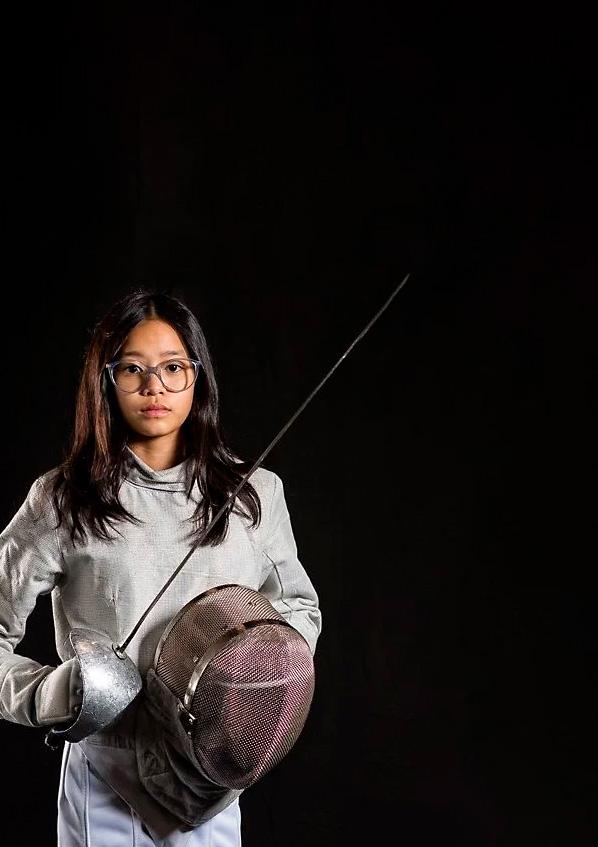
TW: How did you get into the world of fencing and at what age? Who inspired or motivated you to start this sport?
GH: I got into fencing from listening to an audio book where a girl did fencing and started at the age of 7. My mom motivated me to try the sport because I was very into weapons at the time.
TW: What other sport catches your attention?
GH: American Ninja Warrior and a little bit of basketball.
TW: Who are those who have supported you the most in your career as a fencer?
GH: My family, coaches and friends.
TW: What has motivated you to remain a fencer?
GH: When I started making good results is when I realized how great I could be, which is what motivated me to remain a fencer.
TW: What do you consider to be your strength as a fencer?
GH: My athleticism and feel for the sport.
TW: So far, what has been your greatest achievement in fencing?
GH: Winning gold 2 years in a row at the Junior Pan American Championships.
Behind the mask / Gabirela Hwang (USA)
TW: Which fencing figure do you admire the most?
GH: Olga Kharlan
TW: What do you think has been the key to getting to where you are now?
GH: Staying consistent and learning from my mistakes.
TW: What do you consider to be the most difficult thing about being a fencer?
GH: I think the most difficult thing about being a fencer is the constant traveling in and out of the country while trying to keep up with school.
TW: How many hours do you train every day?
GH: 4-5 days a week for 3 hours.
TW: Do you have any special diet? Is there any food that you avoid eating?
GH: Not particularly, but I try to eat extra protein in my meals.
TW: Do you listen to music to train or compete?
GH: Yes, I listen to music all the time.
TW: What are your hobbies?
GH: Hanging out with friends, going shopping and playing video games.
TW: What dream do you have as an athlete and what dream do you have on a personal level?
GH: My dream as an athlete is to make it to the Olympics. My dream on a personal level is to be comfortable in life.
TW: How do you combine your life as an athlete with your personal life?
GH: I treat it like a daily routine by going to school, then to practice and then coming home to do homework.
TW: Could you share with us a difficult moment in your life?
GH: When my grandma passed away.
TW: What has been the happiest moment in your life?
GH: Saving to build my dream computer, putting it together and finishing it.
TW: How do you recover after a defeat?
GH: I just don’t think about the negatives. I also remember that it’s just one tournament and realize that I’m still young and have many years to go.
TW: Who is the coach that has had the most impact on you in your career?
GH: My coach William Becker.
TW: What has been your greatest achievement on the strip?
GH: My greatest achievement on the strip was getting sky hooks and getting a counter counter parry.
TW: What do you think when you fight?
GH: I just try to concentrate, stay calm and keep my mind straight.
TW: Who is the opponent that has made it difficult for you in your years of competition?
GH: Charmaine Andraes. We’ve been fencing each other ever since we were little and have always gone back to back.
TW: What advice would you give to new fencers?
GH: Know if you want to get good, you have to be committed and you need to go to tournaments to get experience.
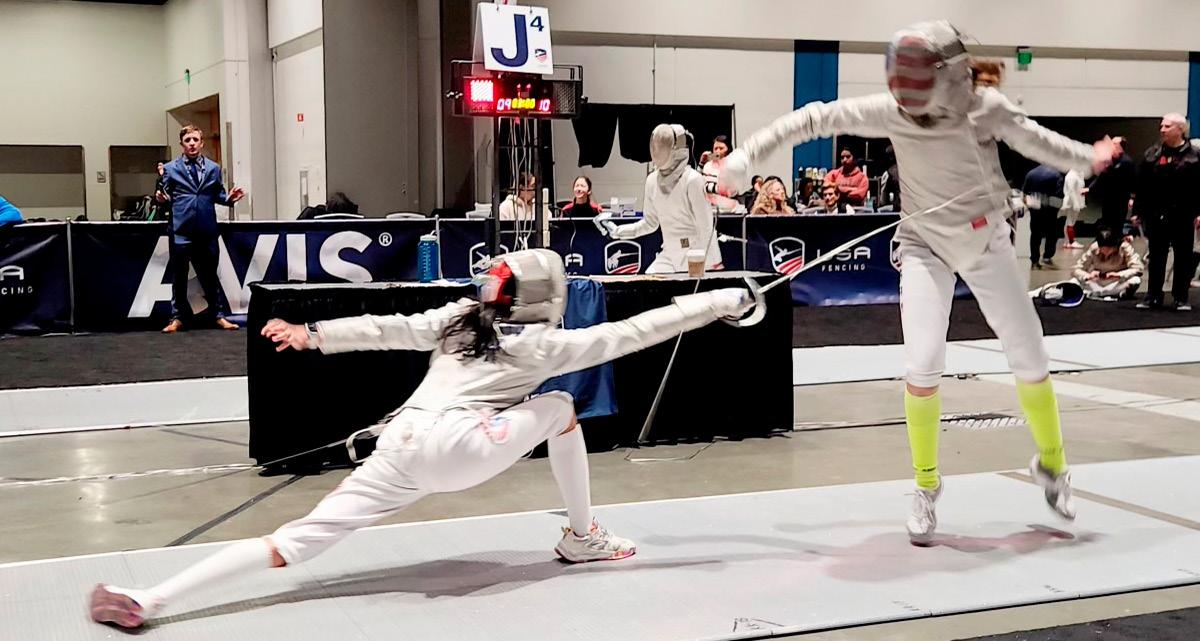
33 TouchéWorld Magazine YOUNG
Poor diet and its influence on sports performance
Establishing a good eating habit is one of the essential complements in the quest to achieve the highest level of any athlete, since in addition to health and physical appearance, “a poor diet has an impact on lower sports performance,” according to Ivett Khawan, Sports Nutritionist (@ nutrideportevzla).
For the nutrition specialist, eating disorders are common in all sports, however they are more accentuated in those where the activity requires a low weight such as gymnastics, boxing, figure skating, fencing, among others.
But, what is a bad diet? Khawan defines it as the fact of consuming more or fewer calories than required, as well as a low amount of protein, where muscle mass is low. For example, a lot of fat, little water intake, vegetables and fruits.
What are the consequences of having a poor diet?
After scientific studies, specialists assure that having a poor diet influences the health, growth and development of the athlete, therefore their sports performance, since it affects:
• Loss of resistance
• Higher incidence of fractures
• Loss of muscle power
• Concentration
• Cardiovascular problems
According to Khawan, to achieve better condition and sports performance, each athlete must establish their diet depending on the
sport, training frequency and body mass.
“The person who practices soccer is not the same as the person who does swimming. Nor is the person who trains two days a week with the person who trains five days a week,” she emphasizes.
How to establish a good diet?
To establish a diet according to the athlete, the specialist recommends knowing the following requirements in advance:
• Amount of calories to consume depending on the sport
• Amount of proteins, fats and carbohydrates to consume depending on the time of day
• How should the diet be before and after training?
• Amount of water and isotonic drink to consume depending on the sport.
For this reason, the importance of establishing a good diet under the advice of a sports nutritionist who accompanies the athlete during their training, in order to achieve greater performance.

34
Poor diet and its influence
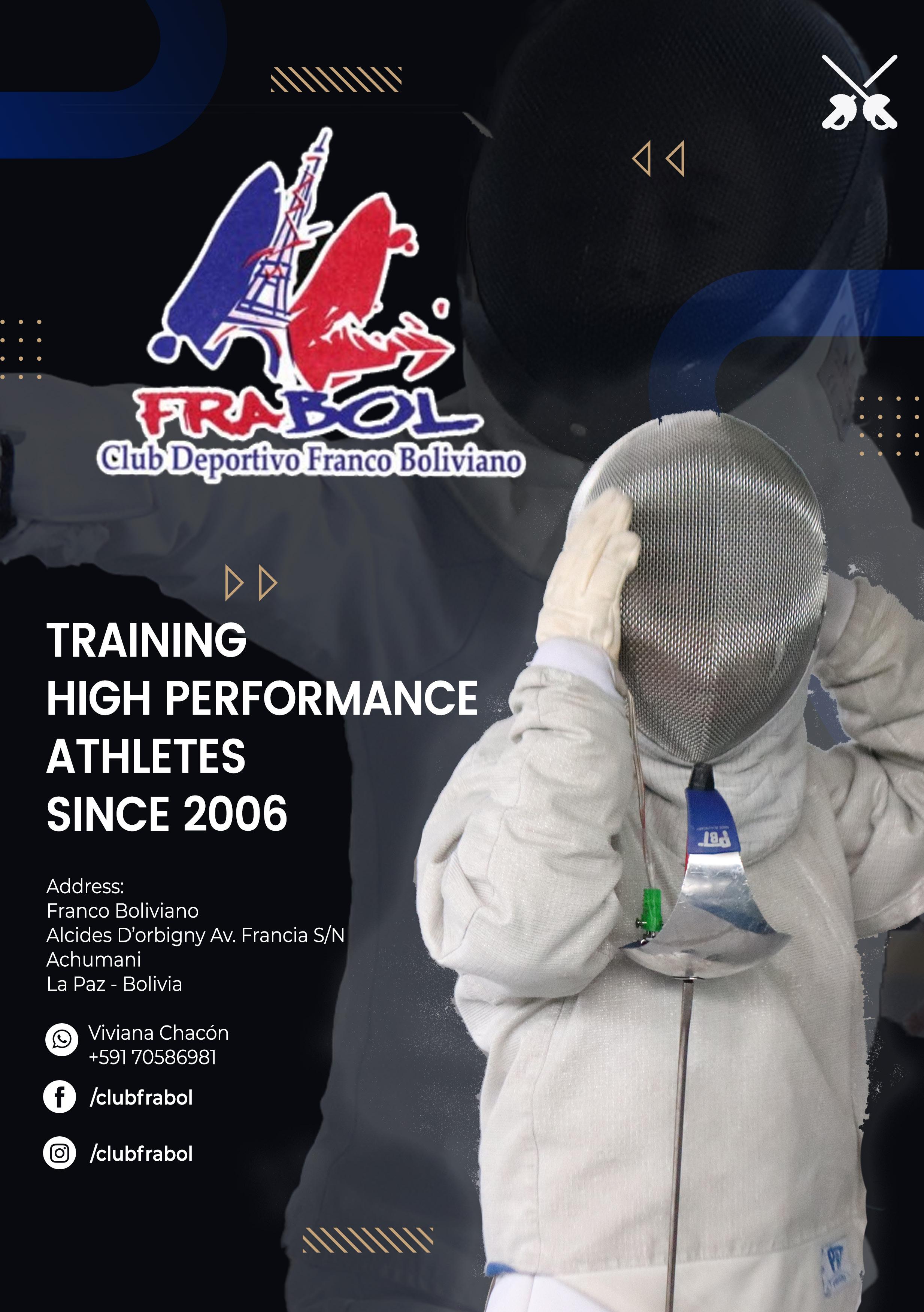
VICTORIAGuerrero
Name: Victoria Guerrero Hidalgo
Nickname: Vic
Place and date of birth: October 30th 2005.
Caracas, Venezuela.
Club: Elite Fencing Club (USA)
Weight: 63 kg.
Height: 1.60 mts.
Weapon: Épée
Handedness: Right
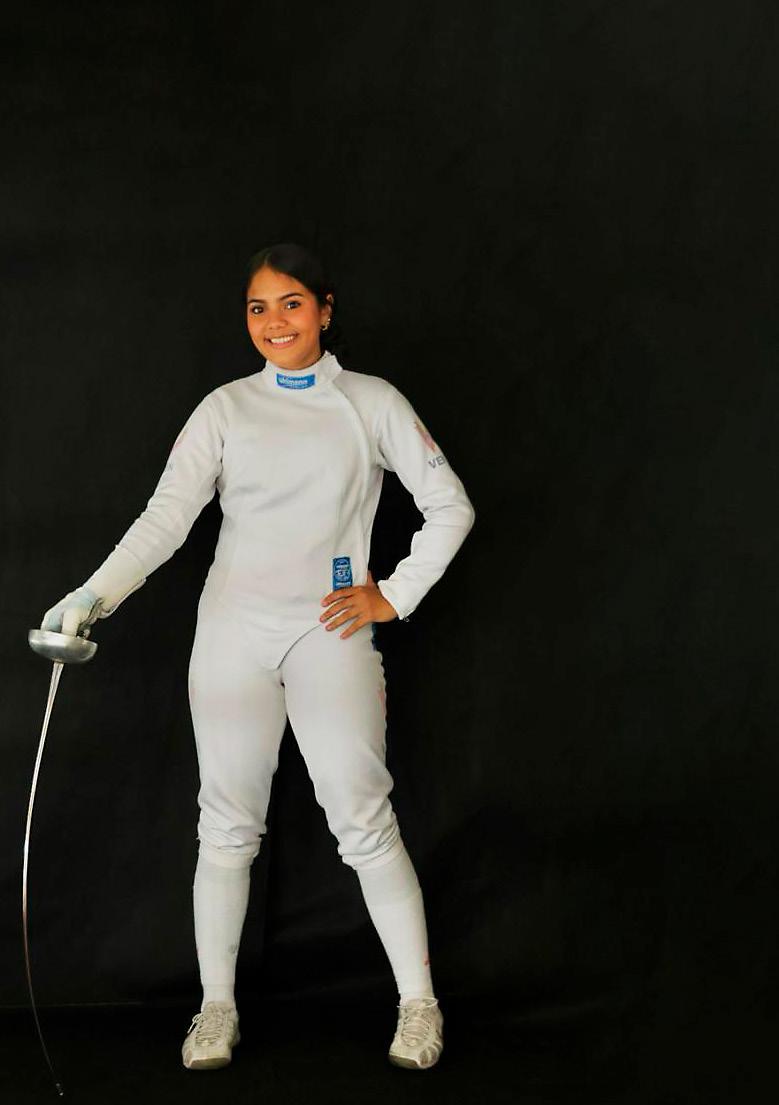

TW: How did you get into the world of fencing and at what age? Who inspired or motivated you to start this sport?
VGH: I started when I was 6 years old. I used to do gymnastics, while my older brother did fencing. One day I couldn’t go to my class and I had to accompany him to fencing and from then on I stayed with fencing. It was love at first sight -laughs-.
TW: How many hours do you train every day?
VGH: I currently train around two to three hours every day. However, there are seasons when the training is greater, doing it in a double session.
TW: Do you have any special diet? Is there any food that you avoid eating?
VGH: I don’t really follow a diet, but I do take care of myself by taking amino acids, collagens and proteins, but I don’t have a specific diet, I just try to eat well.
TW: Do you have an opponent or rival that has made it difficult for you in the platform?
VGH: At the international level, rivals are not easy, but for example, Clarismar Farías, my teammate, I always find her difficult to face.
Behind the mask / Victoria Guerrero (VEN)

TW: Do you listen to music to train or compete?
VGH: No, I don’t like it before competitions because I feel that in a certain way, it distracts me.
TW: Do you have any hobbies or activities that you do apart from fencing?
VGH: I don’t have an activity as such, but I like beauty, fashion.
TW: What dream do you have as a fencer?
VGH: My dream as a fencer is to generate the best possible results, to be an Olympic champion, as well as to be the best in my professional career.
TW: What has been the most difficult moment you have had to experience as a fencer?
VGH: Having to leave my house, and go to a totally different country. Being away from my family is hard enough.
TW: What is the happiest moment that you always remember as a fencer?
VGH: When I won my first gold medal at the 2022 South American Championship in Rosario. It was very
satisfying to see the happiness of my family, who were proud of me.
TW: How do you recover after a defeat?
VGH: First I stay alone analyzing what I did wrong. Then I take the positive from the fight so as not to collapse. Later, when I get to the club, I watch the videos to analyze and correct.
TW: Do you have an anecdote or something curious that happened to you at an event?
VGH: I remember that at this year’s 2024 Pan American Championships, I was so nervous that on the day of my competition, I left fencing equipment at the hotel.
I remember that my classmates laughed at me because they knew that my nerves had betrayed melaughs -.
TW: Who is your coach or coaches that have influenced your life as a fencer so far?
VGH: The coach who has taught me a lot and who helped me get into the Venezuelan national team, Rafael Guerrero. I appreciate him very much for all he has done. Then, while in the national team, I met Oscar Rodríguez “Balú”.
Currently my coach Patrizia Piovesan, who has helped me a lot.
TW: What do you consider to be your greatest achievement so far?
VGH: There are two achievements that I consider very important. The bronze medal I achieved at the 2024 Pan American Junior Championship and the team gold medal at the 2023 Senior Central American Championship.
TW: Do you have any life phrases or philosophy that you always keep in mind in competitions?
VGH: Generally I look at myself in the mirror and I declare that I am the best and I convince myself that I can do everything.
TW: What does fencing mean to you?
VGH: It’s my life. My days revolve around fencing.
TW: What advice would you give to new fencers?
VGH: That everything is a matter of discipline. Stay calm because results come with effort and perseverance.
37
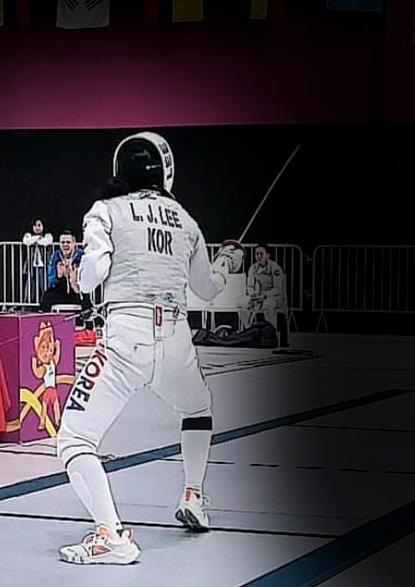
LANALee
Name: Lana Jiahn Lee
Nickname: Lana
Place and date of birth: Seoul, April 11th 2006
Club: Elite Fencing Club, Allez Fencing Korea
Weight: 110
Height: 5’5
Weapon: foil
Handedness: right

the mask /
(KOR)
Behind
Lana Lee
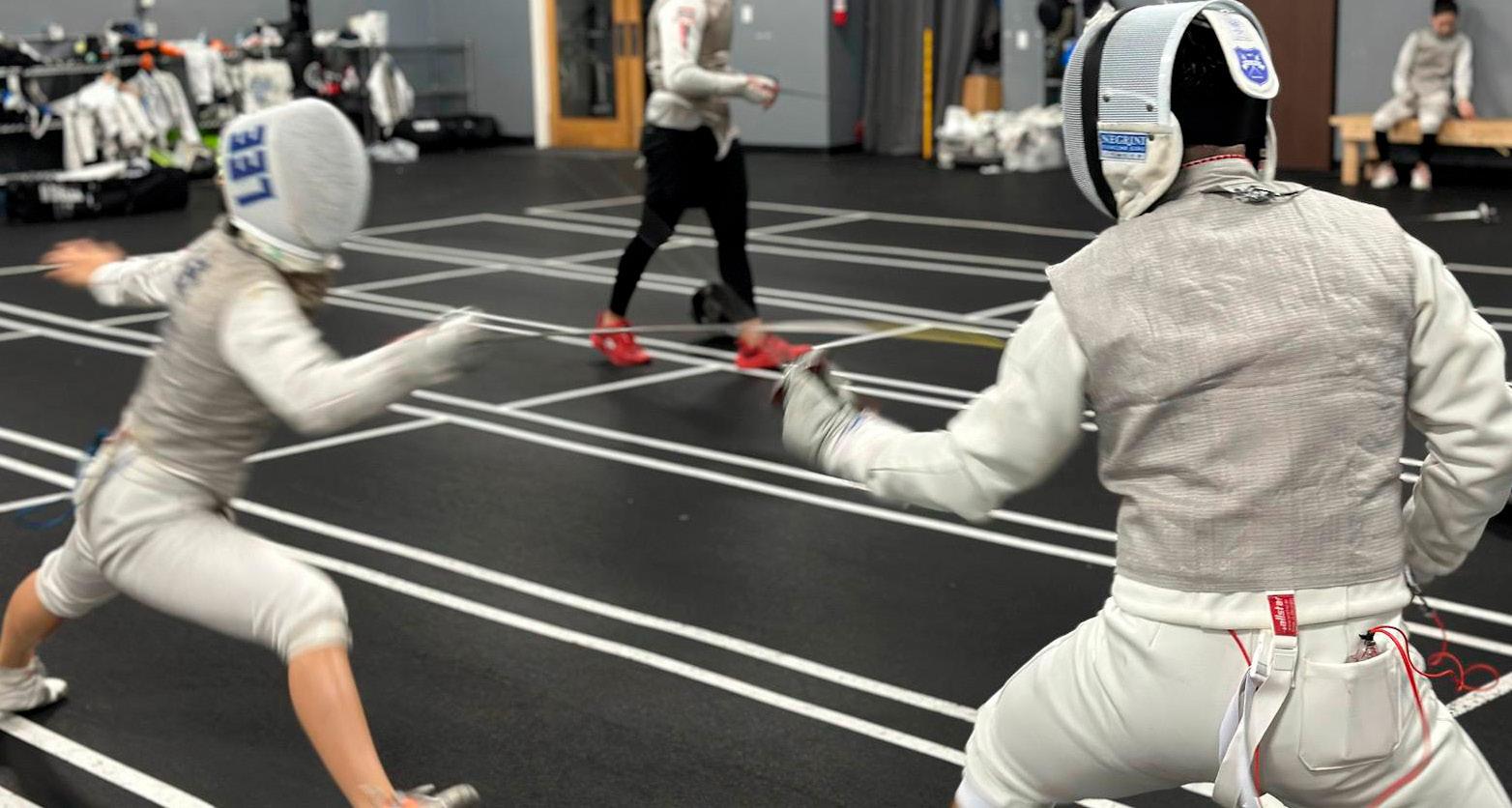
TW: How did you get into the world of fencing and at what age? Who inspired or motivated you to start this sport?
LJL: My best friend started fencing, which prompted me to try the sport. Initially, I enjoyed fencing, but I began to love it after competing more often.
TW: Who are those who have supported you the most in your career as a fencer?
LJL: My mom and my coach Tarek Ayad
TW: What has motivated you to remain a fencer?
LJL: My coach Tarek and my progress in fencing.
TW: Which fencing figure do you admire the most?
LJL: Coach Tarek Ayad
TW: What do you think has been the key to getting to where you are now?
LJL: My coaches, resilience, and selftrust
TW: How many hours do you train every day?
LJL: Typically, I train 2-3 hours every weekday.
TW: Do you have any special diet? Is there any food that you don’t eat?
LJL: I try to make sure my meals are balanced with enough protein.
TW: Do you listen to music to train or compete?
LJL: I always listen to music during tournaments because it keeps me focused and prevents me from overthinking.
TW: What are your hobbies?
LJL: I love listening to music and spending time with my family & friends.
TW: What goals do you have as an athlete and what goals do you have on a personal level?
LJL: I want to continue to represent Korea internationally, fully trust in myself, and fence freely without fear or doubt.
TW: How do you combine your life as an athlete with your personal life?
LJL: I utilize my time in the car and breaks between school and practice. I try to spend time with my family and friends to relieve the stress.
TW: We would like you to tell us an anecdote that you remember for a special reason.
LJL: I remember my training and lessons with coach Tarek during the summer of 2023. We focused on building self-confidence which transformed my fencing and results. It was a great reminder that fencing is all about the mindset.
TW: How do you recover after a defeat?
LJL: I rewatch my recorded videos to reflect on my mistakes. I also try to remind myself that progress is not linear and mistakes are okay.
TW: Who is the coach that has had the most impact on you in your career?
LJL: Definitely my coach, Tarek Ayad, and Allez Fencing coaches that support me from Korea.
TW: What has been your greatest achievement on the piste?
LJL: 12th place in Junior World Cup.
TW: What do you think when you fence?
LJL: I try to clear my mind and focus on winning.
TW: What advice would you give to new fencers?
LJL: Have fun, be patient, and fence with confidence.
39

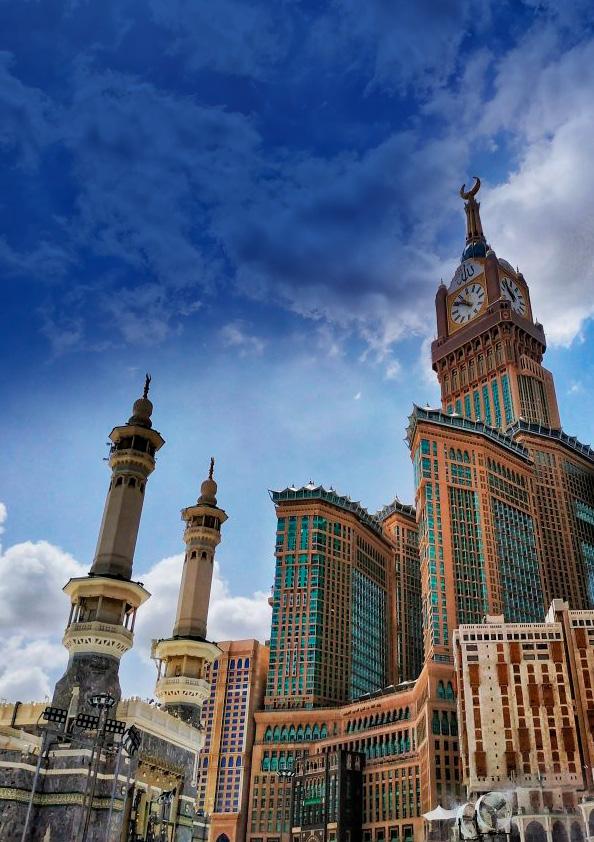
Riyadh The prosperous and cosmopolitan city of
Within the framework of the 2024 Junior and Cadet Fencing World Championships, at TouchéWorld | Magazine we invite you to get to know the prosperous city of Riyadh, capital of Saudi Arabia and current host of the largest youth fencing event.
Riyadh, one of the most conservative places in the country, went from being a small desert town to becoming a cosmopolitan city noted for its resplendent architecture, which mixes with natural and historical places from the oldest times of the Saudi kingdom.
Known as the cultural city of Saudi Arabia, Riyadh has continued to grow since 1932 when it became an independent state.
Today the city offers all its visitors the opportunity to get to know and enjoy it, visiting the National Museum as

well as the modern constitution of the Saudi kingdom, walking through the Al Masmak fortress, while to the north, about 30 km away, is the historical site of Diriyah, the original city of the Al Saud dynasty, the Saudi royal family.
When visiting Riyadh, you can feel the contrast of the tribal lifestyle with the modernity of the skyscrapers of the Al Olaya business district, where the Kingdom Center Tower and the Al Faisaliyah Tower stand out, as well as the natural spectacle offered by the Mount Fihrayn, a steep cliff to the northwest, with breathtaking views over the desert.
The city of Riyadh, which prides itself on hosting major cultural events, continues to bring joy, creating countless entertainment destinations, so that visitors can enjoy new and unknown experiences.
To visit!

The National Museum of Saudi Arabia is one of the most important buildings in the history and culture of Riyadh. It is located within the prestigious Abdulaziz Historical Centre, and offers a perfect combination of the building’s modern architecture with fascinating historical exhibits.
The collections are distributed in beautiful rooms with themes such as geology and evolution in the region, Arab kingdoms, lifestyles, religious history, as well as modern history around the Kingdom and its creation.
One of the main features of the museum is the wonderful display of relics and artifacts belonging to Mecca.
National Museum
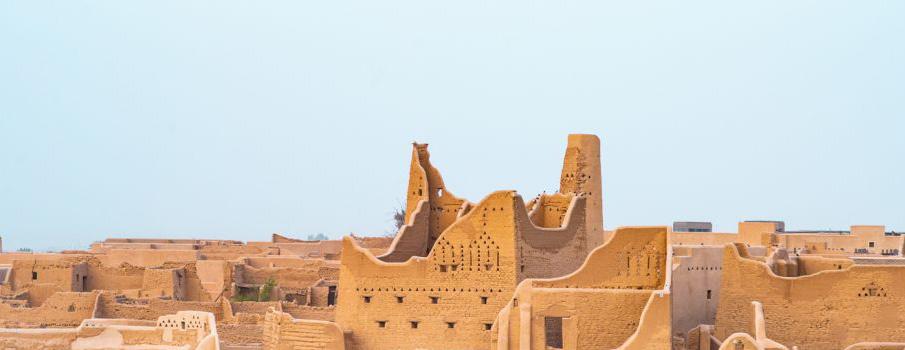
Thanks to its rich history and culture, Diriyah Saudi Arabia is a fast-growing tourist destination on the bucket list of all travelers visiting the Kingdom of Saudi Arabia. Diriyah is conveniently located on the northwestern outskirts of Riyadh, but is less than 30 minutes from King Khalid International Airport and 15 minutes from central Riyadh. Diriyah is steeped in
history as the former capital of the first Saudi state.
This charming city allows travelers to explore Saudi Arabia’s rich past and culture.
Diriyah Al Olaya
Al Olaya is the elegant commercial center of Riyadh, characterized by prestigious skyscrapers such as the steel and glass Kingdom Tower, overlooking the city from its skybridge as well as the Al Faisaliah Center amongst other.
Several modern, air-conditioned shopping centers offer luxury international fashion
Diriyah also offers scenic natural beauty and some of the popular attractions in the surrounding area include the At-Turaif World Heritage Site, Buraiji Heritage Park and the newly opened Bujairi Terrace, which offers world-class restaurants and cafes.

brands where children can also play in some areas and international fast food restaurants can be found. From simple shawarma stands to pleasant cafes with desserts are mixed with elegant hotel restaurants.
43 TouchéWorld Magazine YOUNG
Kingdom Tower
This emblematic building is located in the Al Olaya district, Riyadh, in Saudi Arabia. It is located between two of the most important avenues, Al Olaya Avenue in the northwest and King Fahad Avenue in the southwest; It was strategically placed in this area to give it a certain prominence, which to date it has achieved.

Al Faisaliyah Center is a commercial skyscraper located in the financial district of Riyadh, Saudi Arabia. It is the third tallest building in Saudi Arabia after Kingdom Center and the Abraj Al Bait Towers.
It contains an exterior observation deck; On the ground floor there is a shopping center with important international brands. Al Faisaliyah Center is about 267 meters high and has 44 floors.
The four corner beams of Al Faisaliyah Center meet at the top over a golden sphere. It is said that the design is based on a pen. Inside the golden sphere, there is a luxury revolving restaurant.
The architectural height of the skyscraper is 302.33 meters, with 41 floors and an area of 185,000 m2. Its structure is made of concrete and steel; It contains 45 elevators, 22 escalators and a parking lot for more than 3,200 cars.
There is also a shopping mall called Al Mamlaka, it is divided into four levels and its location is on the first floors of the building. It is worth mentioning that it is made up of around 161 stores.

Al Faisaliah Center Monte Fihrayn
Known as The End of the World, it is one of the most popular tourist destinations in Saudi Arabia, which receives its nickname from the continuous view of the horizon it offers over its 300-meter-high cliffs, which dominate the surrounding plain.
It is part of the longer Tuwaiq Escarpment, descending to over 305 meters to the floor of the ancient ocean.
From the top of the cliffs, you can see dry rivers winding through the land and you may also see camels wandering away below, an ancient caravan route that once went through these lands. The sunset can be enjoyed from the top of the mountain and unforgettable commemorative photos can be taken.

44
The magnificent Al Masmak Fortress, located in the capital city of Riyadh, is an integral part of the rich history of Saudi Arabia.
It was built around 1865, and its exterior is made of mud brick and ceramic, a formidable facade to admire.
The entrance road is surrounded by palm trees, and on the sides of the fortress there are ancient watchtowers. Inside, it has a variety of wooden patios and labyrinths, and today operates as a splendid museum exhibiting items related to agriculture, ancient weapons as well as regional costumes, among others.
Visiting this place is ideal to learn a little more about the history and legacy of the Kingdom.
Al Masmak Fortress

Al- Turaif
The Al-Turaif district allows you to walk among the evidence of the constitution of the first Saudi state as well as seeing the style of ancient Najd and Islamic architecture, also explore its castles and buildings built with mud and palm tree trunks, which gave them a durability to survive over the years.
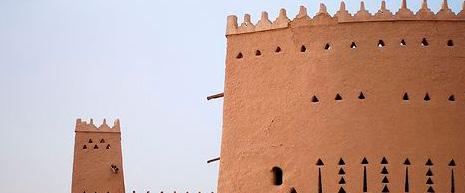
Al-Turaif in Diriyah has been inscribed on the UNESCO World Architectural Heritage List, where we travel back in time and stop at essential stations in the history of the Kingdom of Saudi Arabia, when the Diriyah region was the capital of the first Saudi state and the home town of traders from the Arabian Peninsula.
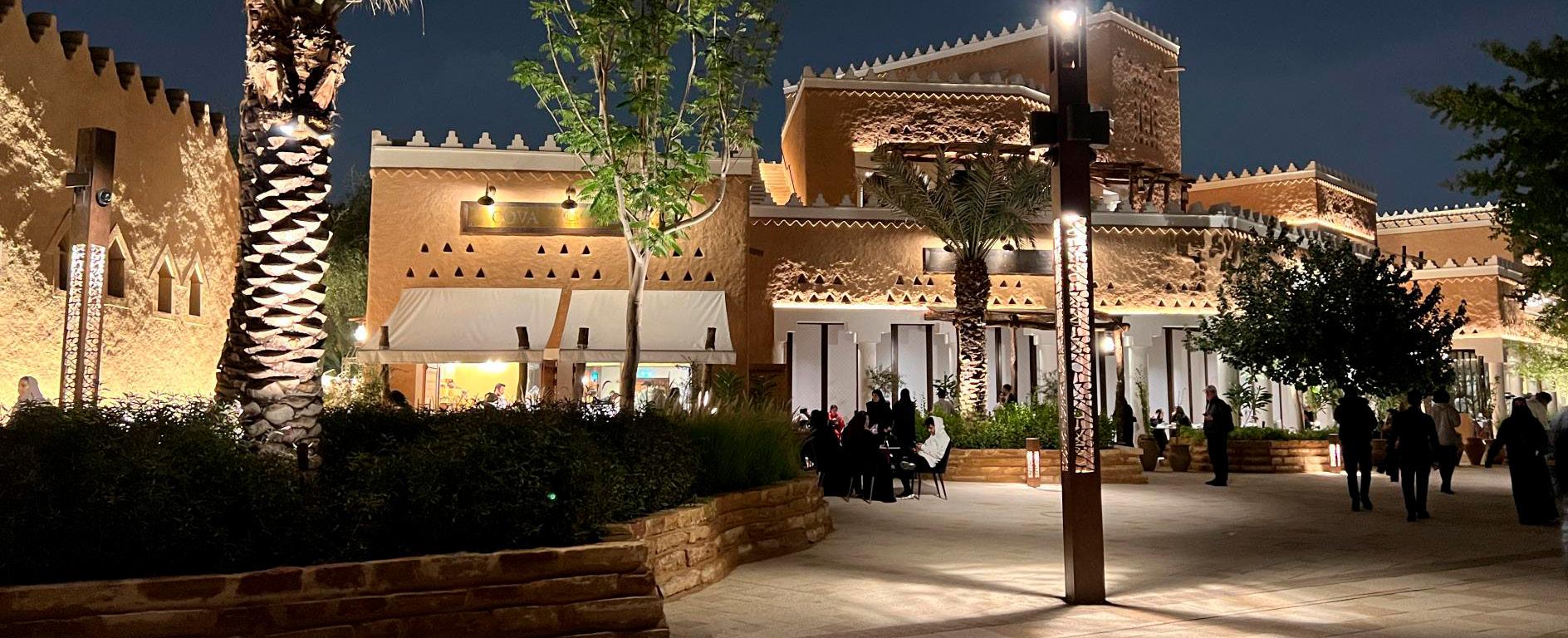
Bujairi Terrace
Bujairi Terrace is the new premium dining destination for food lovers in the heart of Riyadh’s historic Diriyah district.
This exceptional culinary destination overlooks the At-Turaif World Heritage Site, which was the birthplace of the first Saudi state and the ancestral home of the Saudi royal family.
As part of the project, the terrace features over 21 world-renowned restaurants providing visitors with exquisite international cuisines along with a wide variety of traditional local dishes in a truly beautiful setting.
45 TouchéWorld Magazine YOUNG

To secure a thriving future for fencing we must constantly strive to increase our media outreach and marketing efforts.
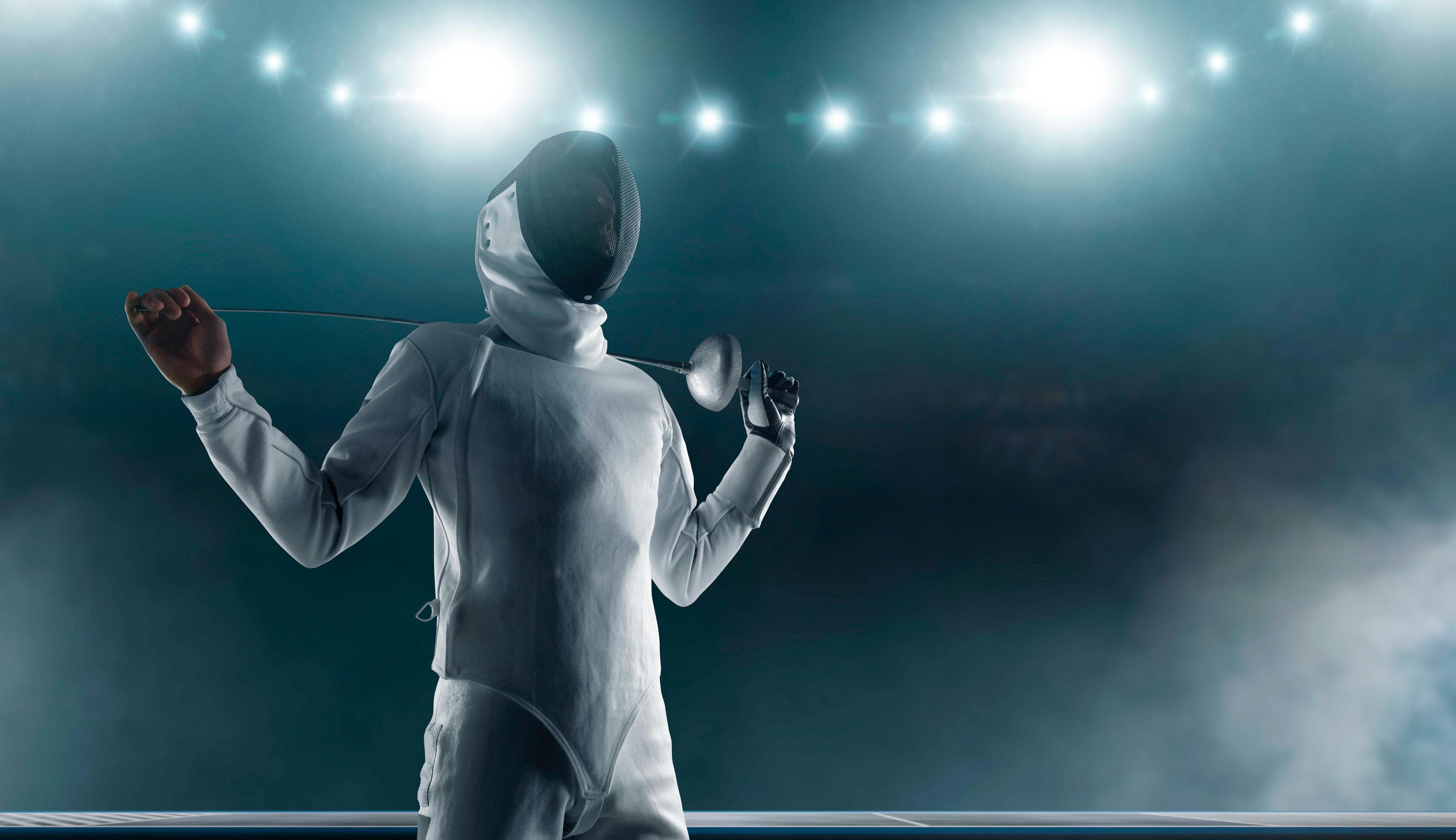

Let us not limit ourselves to the Olympics alone, but instead, take the initiative to showcase the beauty and intensity of our sport to the world. P


Click here to join our Patreon.
O D U C I N G H I G H - Q U A L I T Y
O U R N A M E N T B R O A D C A S T S .
U R A T I N G E N T E R T A I N I N G A N D
N F O R M A T I V E F E N C I N G C O N T E N T .
I S T R I B U T I N G C O N T E N T
L O B A L L Y .
E L P I N G F E N C I N G E N T I T I E S
X P A N D T H E I R R E A C H .
A X I M I Z I N G O P P O R T U N I T I E S F O R
R O W T H .
R
T
C
I
D
G
H
E
M
G
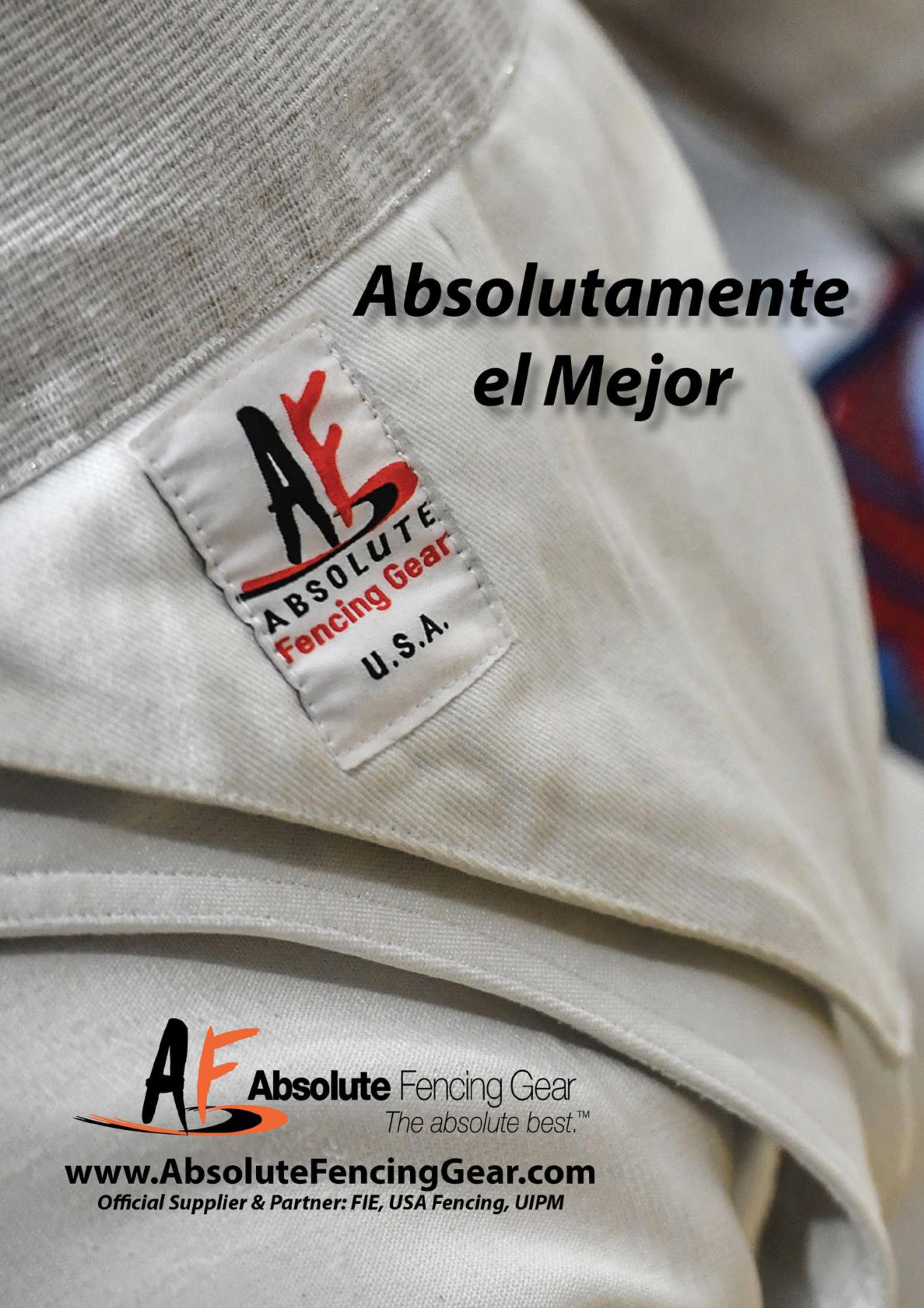





 Calú Pargas Gabaldón CEO & Fundadora Editorial Touché
Calú Pargas Gabaldón CEO & Fundadora Editorial Touché























































